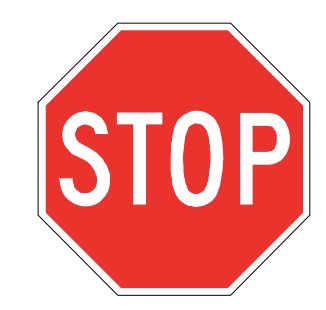 | 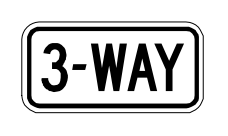 | 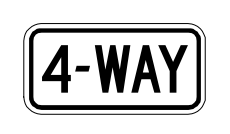 | 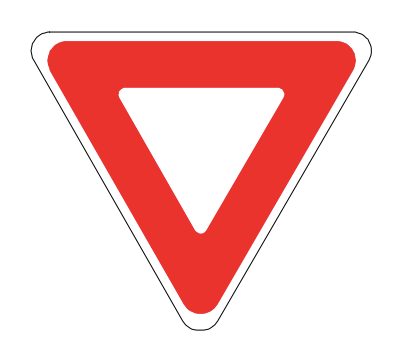 |
| STOP SIGN | 3-WAY TAB | 4-WAY TAB | YIELD |
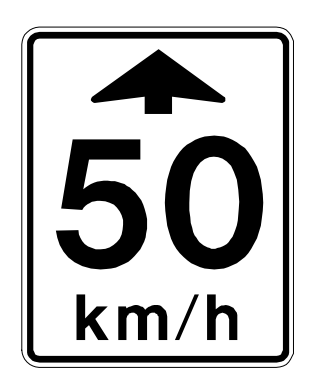 | 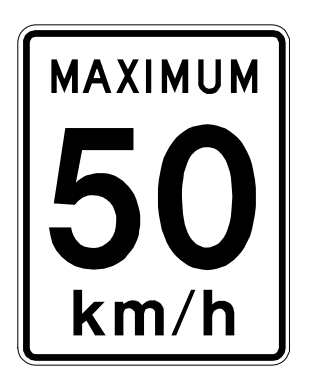 | 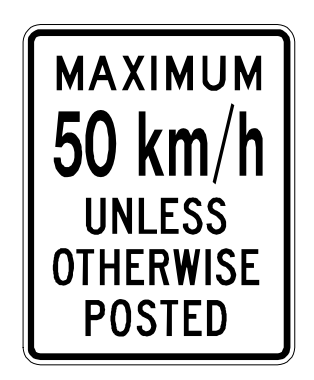 | 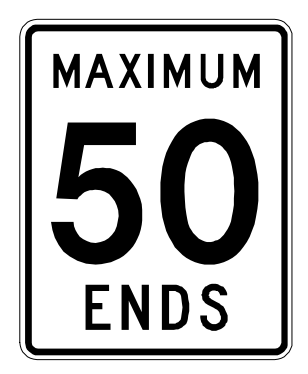 |
| MAX SPEED AHEAD | MAX SPEED | MAX SPEED UNLESS POSTED | SPEED LIMIT ENDS |
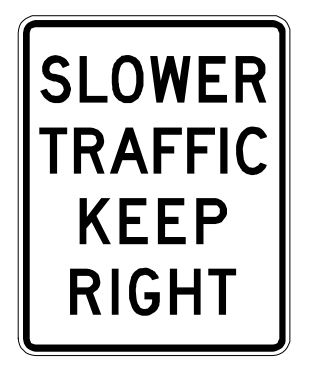 | 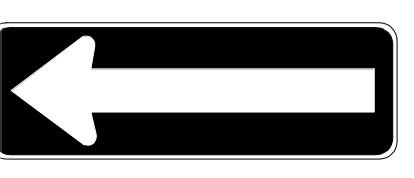 | 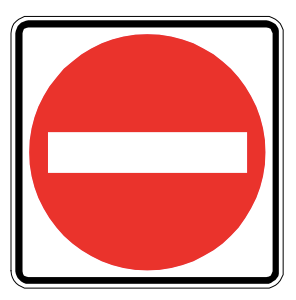 | 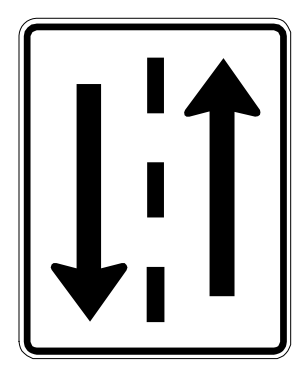 |
| SLOWER TRAFFIC KEEP RIGHT | ONE WAY | DO NOT ENTER | TWO WAY TRAFFIC |
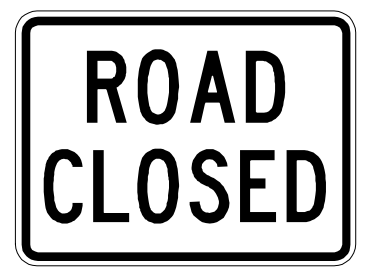 | 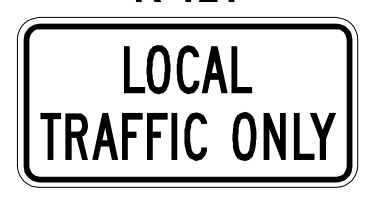 | 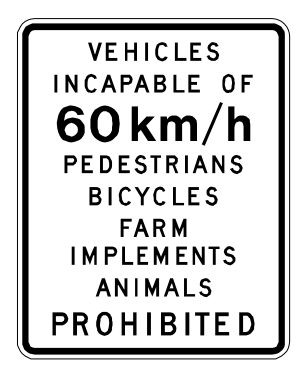 | 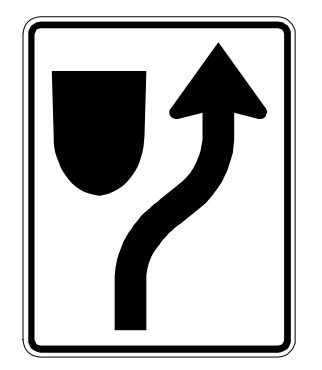 |
| ROAD CLOSED | LOCAL TRAFFIC ONLY | SLOW VEHICLES PROHIBITED | KEEP RIGHT |
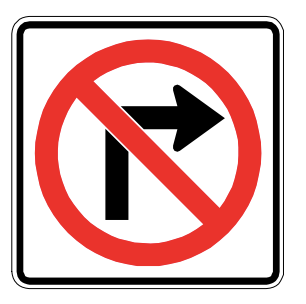 | 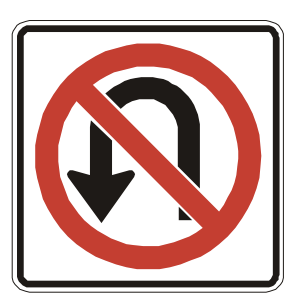 | 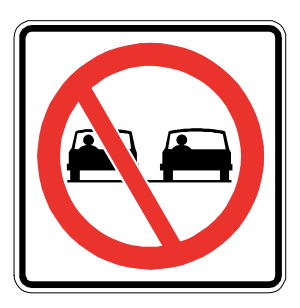 | 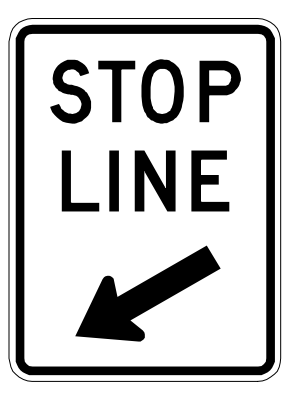 |
| NO RIGHT TURN | NO U-TURN | DO NOT PASS | STOP LINE INDICATOR |
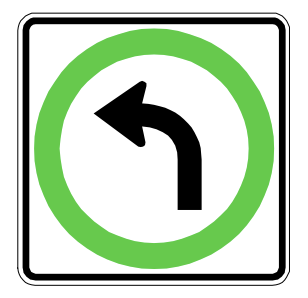 | 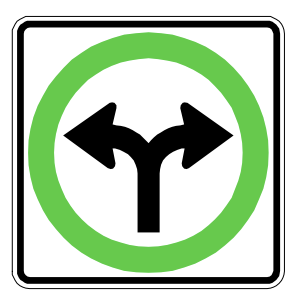 | 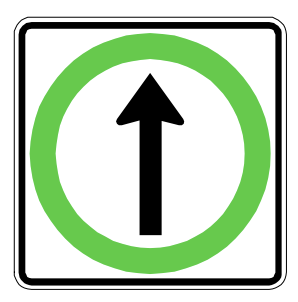 | 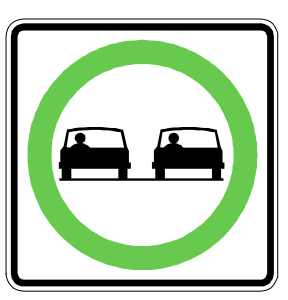 |
| TURN LEFT | TURN LEFT OR RIGHT | NO TURNS | PASSING PERMITTED |
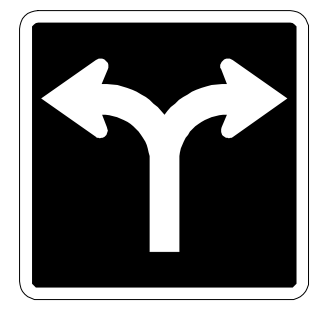 | 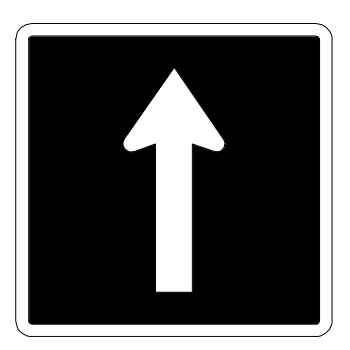 | 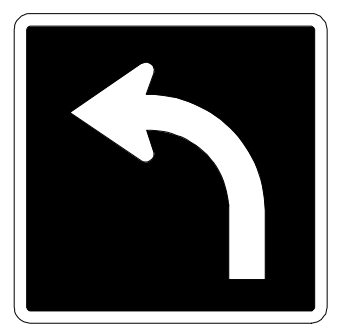 | 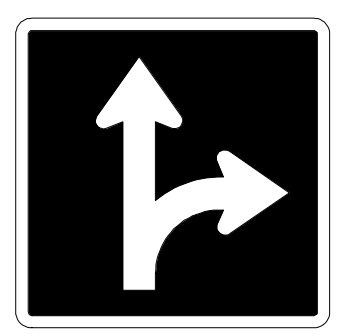 |
| THIS LANE LEFT OR RIGHT | THIS LANE THRU | THIS LANE LEFT | THIS LANE THRU OR RIGHT |
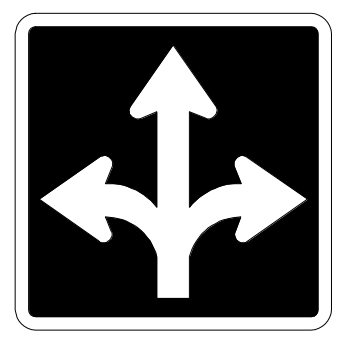 | 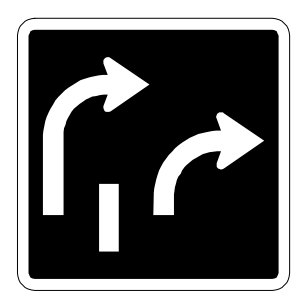 | 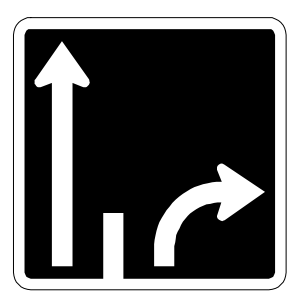 | 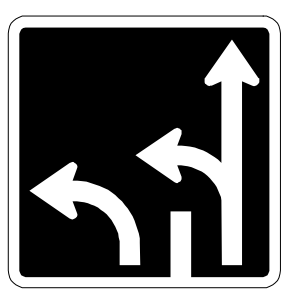 |
| THIS LANE LEFT, THRU OR RIGHT | TWO LANES LEFT | LEFT LANE THRU, RIGHT LANE RIGHT | LEFT LANE LEFT, RIGHT LANE LEFT OR THRU |
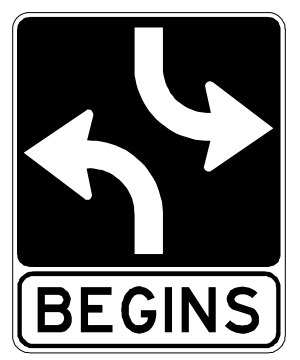 | 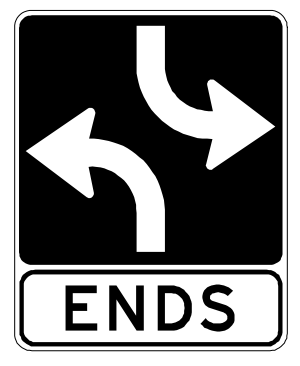 | 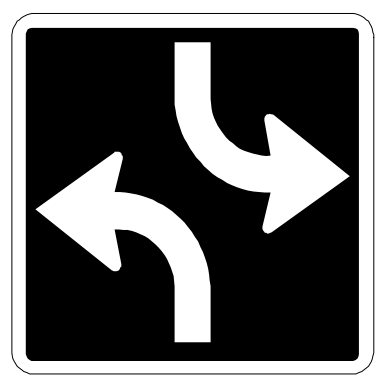 | 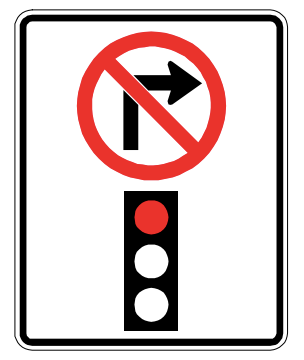 |
| TWO-WAY LEFT TURN LANE BEGINS | TWO-WAY LEFT TURN LANE ENDS | TWO-WAY LEFT TURN LANE | NO RIGHT TURN ON RED SIGNAL |
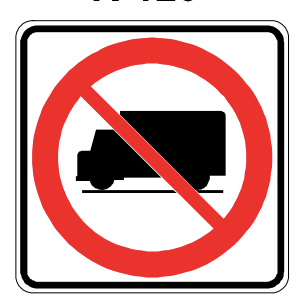 | 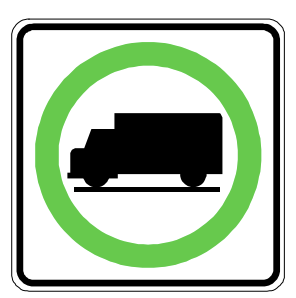 | 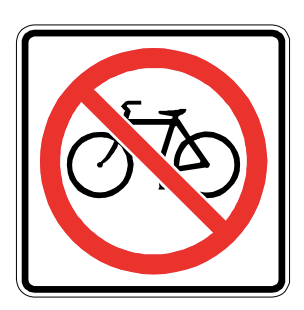 | 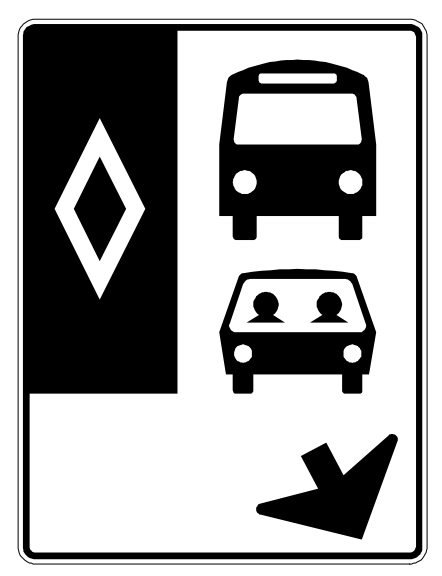 |
| NO TRUCKS | TRUCK ROUTE | NO BICYCLES | RESERVED LANE |
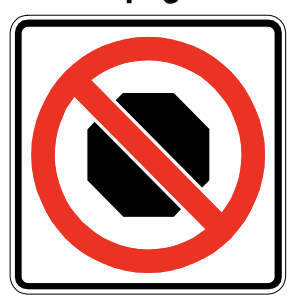 | 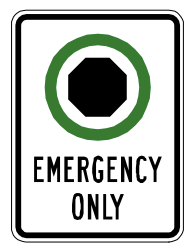 | 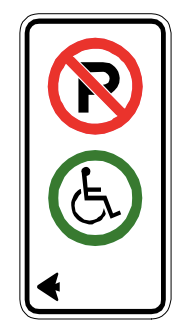 | 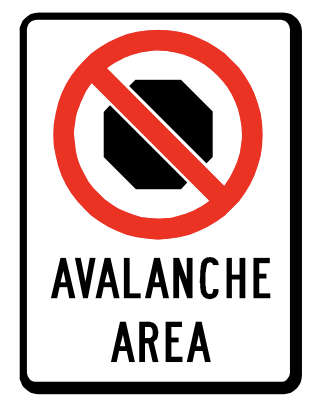 |
| NO STOPPING | EMERGENCY PARKING ONLY | HANDICAPPED PARKING ONLY | NO STOPPING AVALANCHE AREA |
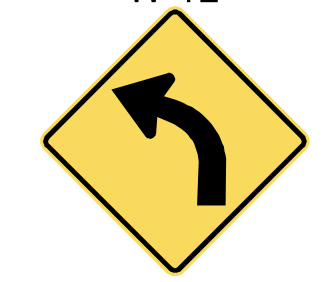 | 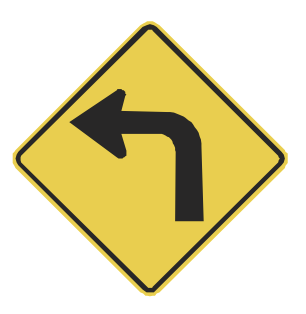 | 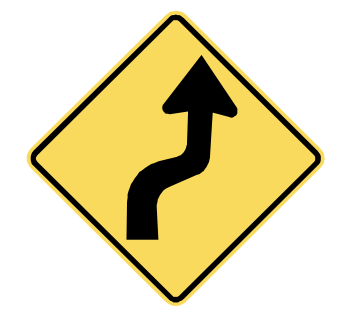 | 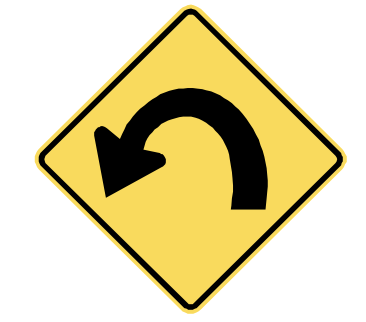 |
| CURVE WARNING | CURVE WARNING | REVERSE CURVE | SWITCHBACK |
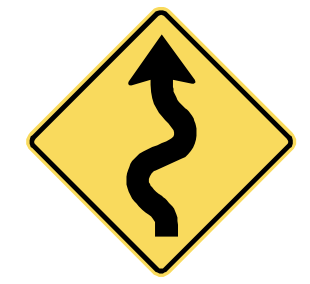 | 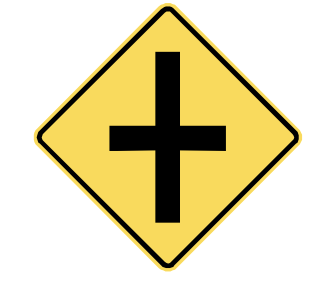 | 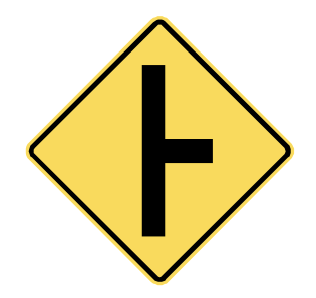 | 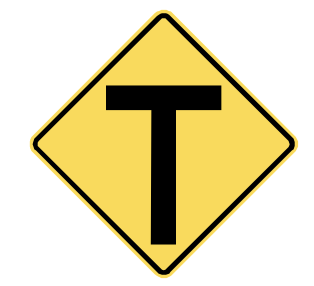 |
| WINDING ROAD | CONCEALED CROSSROAD AHEAD | CONCEALED SIDE ROAD AHEAD | “T” INTERSECTION AHEAD |
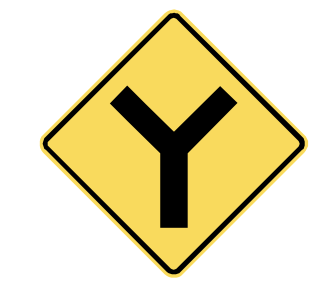 | 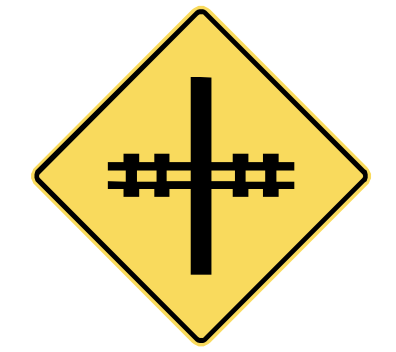 | 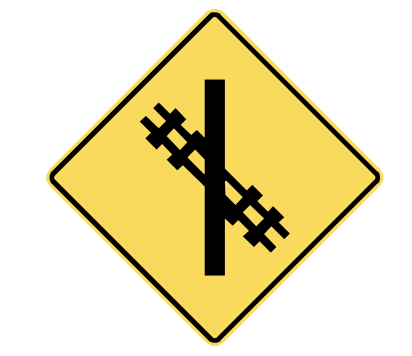 | 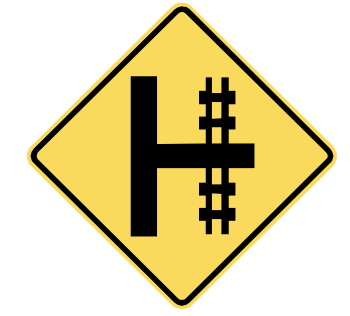 |
| “Y” INTERSECTION AHEAD | RAILWAY CROSSING AHEAD | RAILWAY CROSSING AHEAD | RAILWAY CROSSING SIDE ROAD AHEAD |
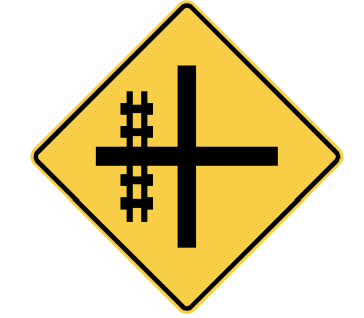 | 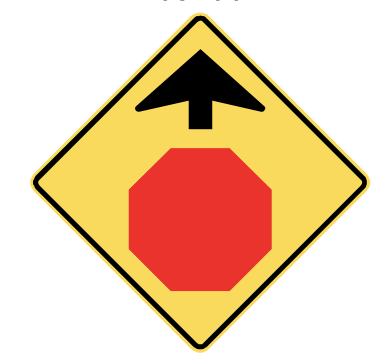 | 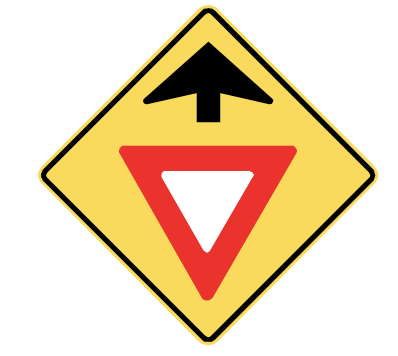 | 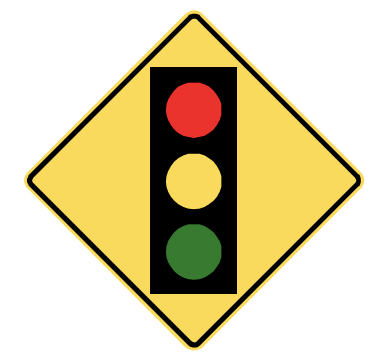 |
| RAILWAY CROSSING SIDE ROAD AHEAD | STOP SIGN AHEAD | YIELD SIGN AHEAD | TRAFFIC SIGNAL AHEAD |
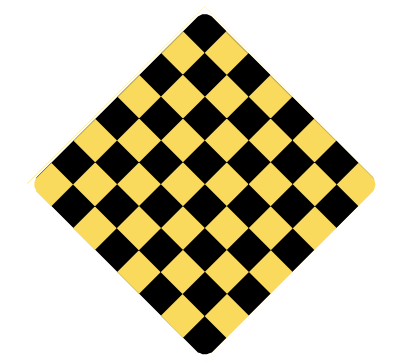 | 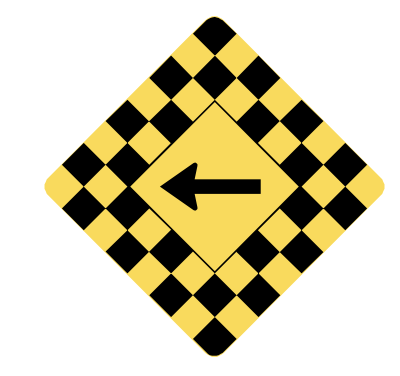 | 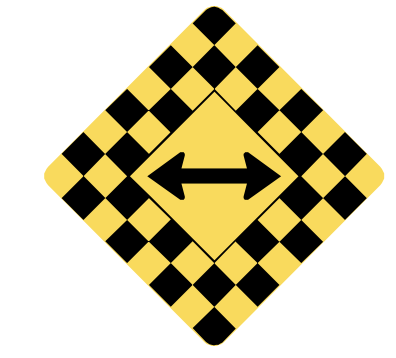 | 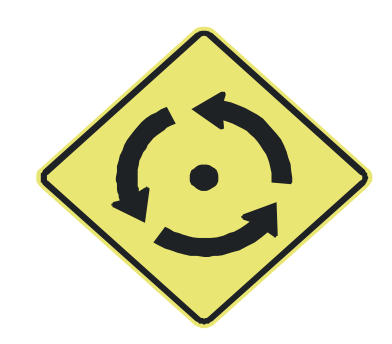 |
| ROAD TERMINATES | ROAD TERMINATES -ABRUPT CHANGE OF ALIGNMENT | ROAD TERMINATES – “T” INTERSECTION | ROUNDABOUT WARNING |
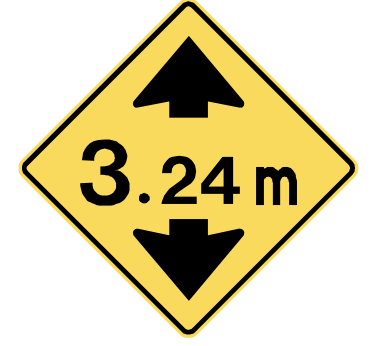 | 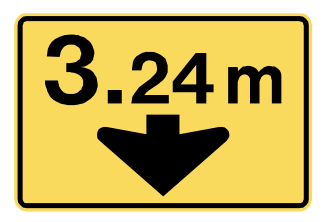 | 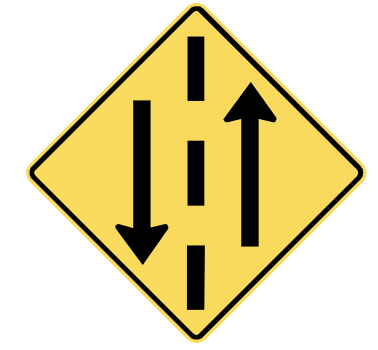 | 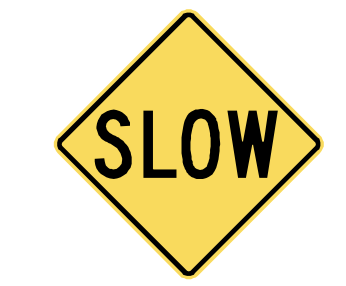 |
| ADVANCE LOW CLEARANCE WARNING | LOW CLEARANCE WARNING | TWO WAY TRAFFIC AHEAD | SLOW – AT LEAST 30 KM/HR SLOWER THAN SPEED LIMIT |
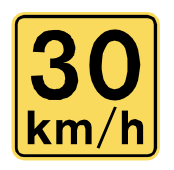 | 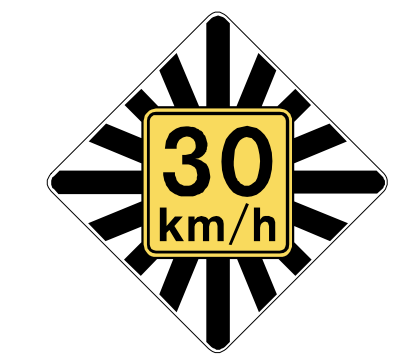 | 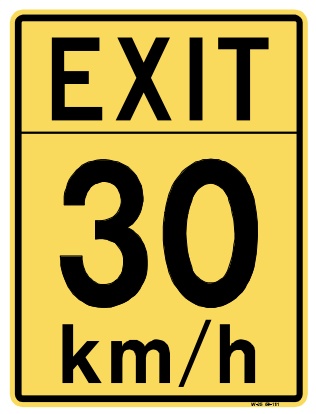 | 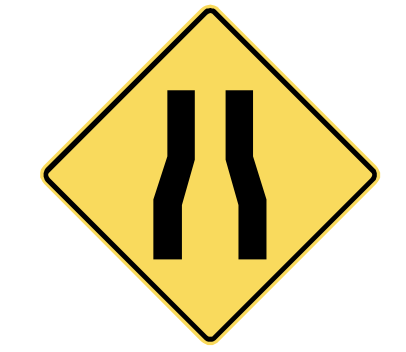 |
| ADVISORY SPEED | SUNBURST ADVISORY SPEED – POTENTIALLY HAZARDOUS ROADWAY SECTION AHEAD | ADVISORY EXIT SPEED | ROAD NARROWS |
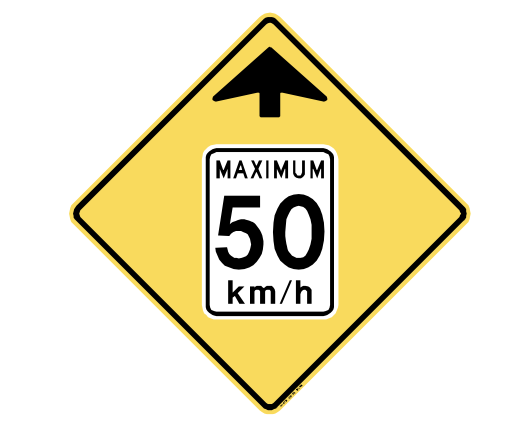 | 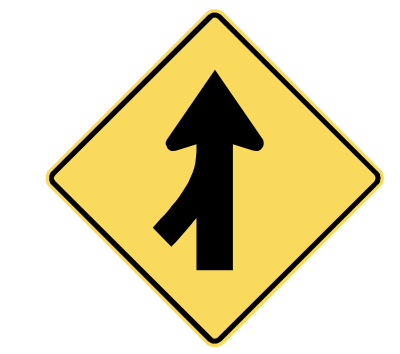 | 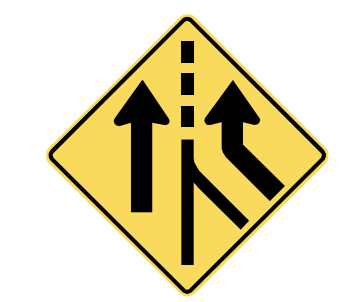 | 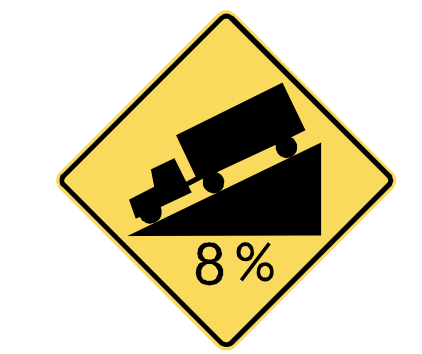 |
| SPEED LIMIT AHEAD | MERGING TRAFFIC AHEAD | ADDED LANE | STEEP HILL WARNING |
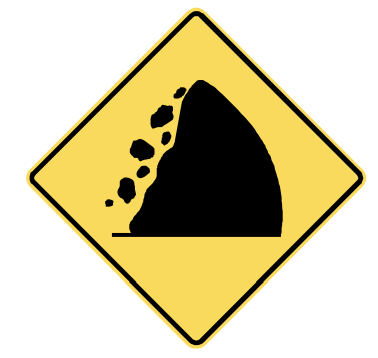 | 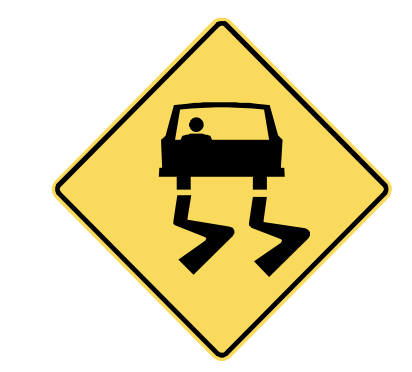 | 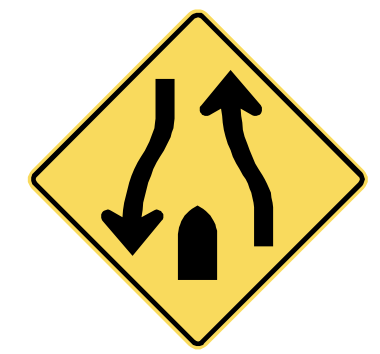 | 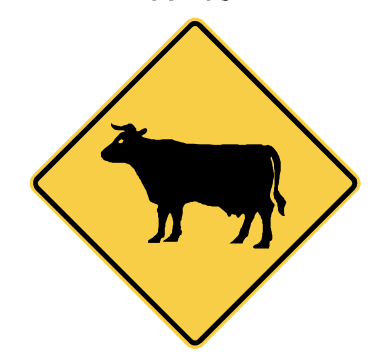 |
| WATCH FOR ROCKS/DEBRIS ON ROAD | SLIPPERY ROAD | DIVIDED HIGHWAY ENDS | CATTLE CROSSING |
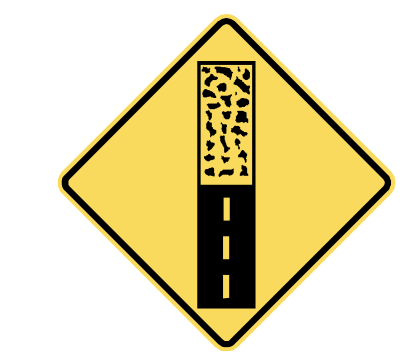 | 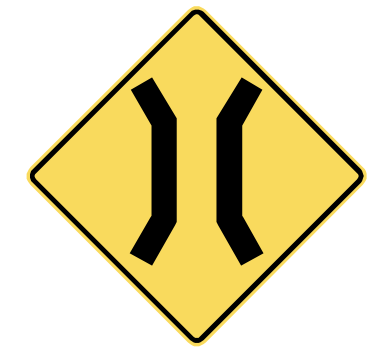 | 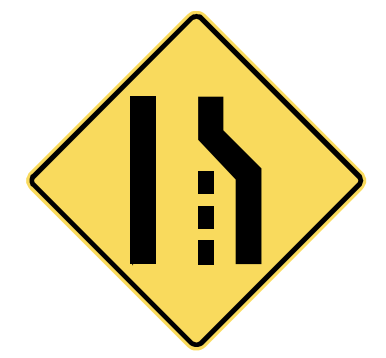 | 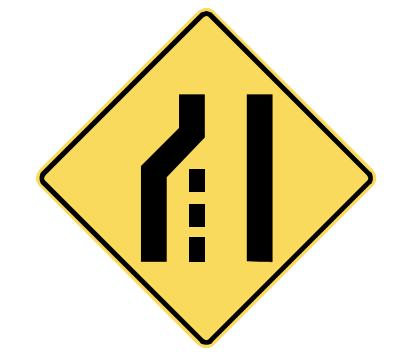 |
| PAVEMENT ENDS (SWITCH TO DIRT/GRAVEL) | NARROW STRUCTURE AHEAD | RIGHT LANE ENDS AHEAD | LEFT LANE ENDS AHEAD |
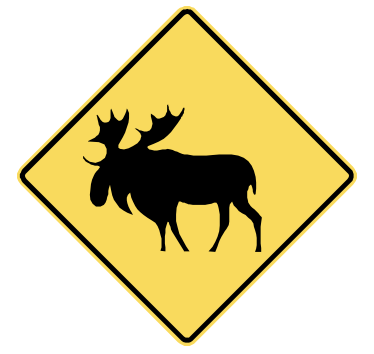 | 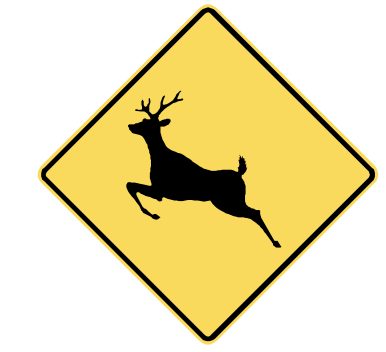 | 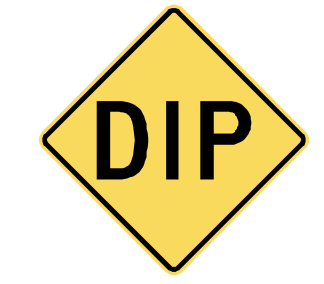 | 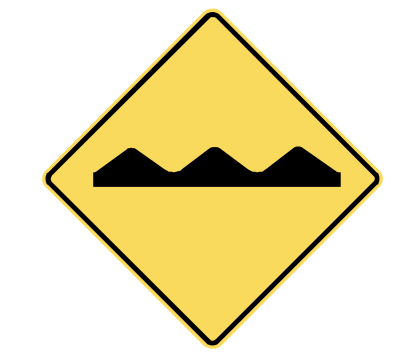 |
| WATCH FOR MOOSE | WATCH FOR DEER | DEPRESSION IN ROADWAY AHEAD | BUMP/ROUGH ROAD |
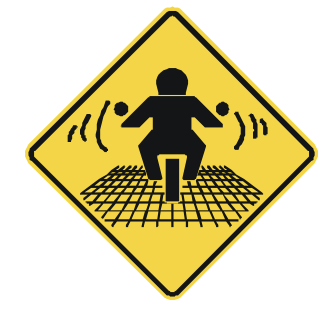 | 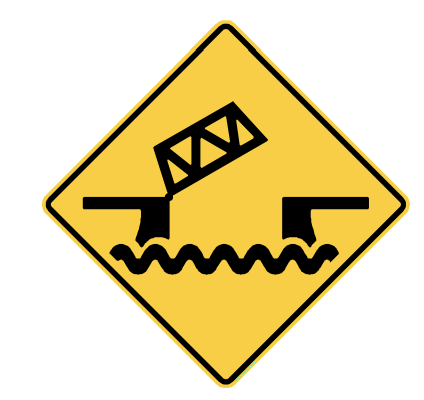 | 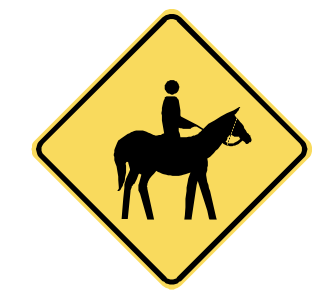 | 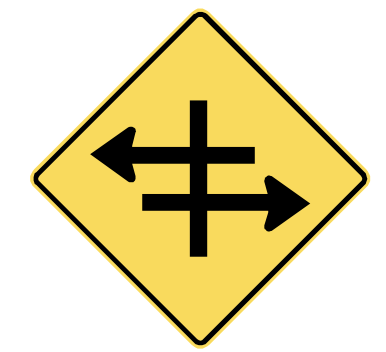 |
| METAL BRIDGE DECK | OPENING BRIDGE | HORSE AND RIDER | DIVIDED HIGHWAY AHEAD |
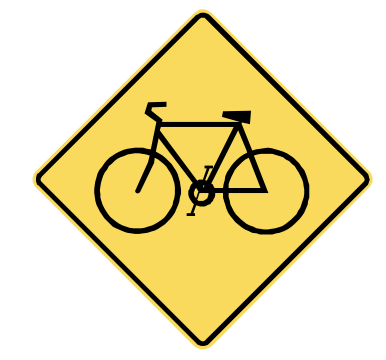 | 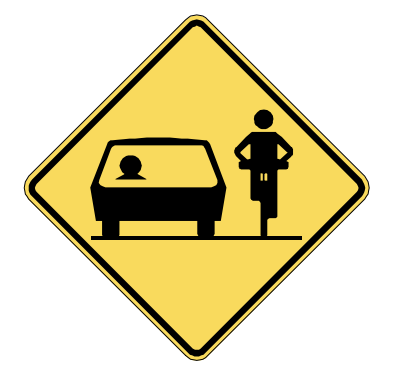 | 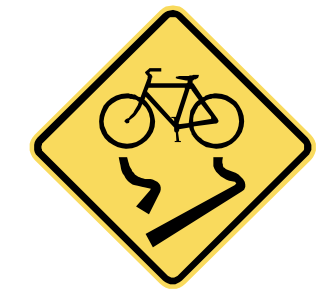 | 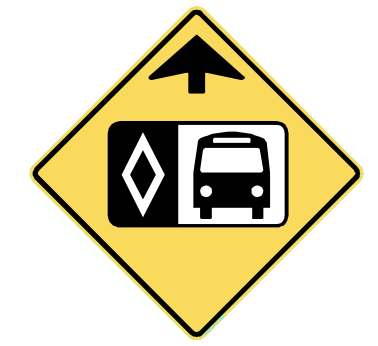 |
| CYCLIST CROSSING | CYCLISTS ON ROADWAY | CYCLIST WARNING (HAZARDOUS ROAD AHEAD FOR CYCLISTS) | RESERVED LANE AHEAD |
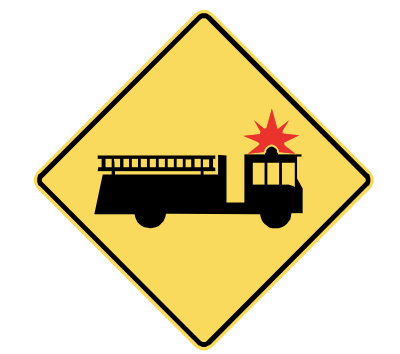 | 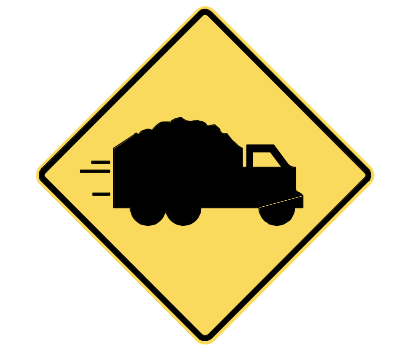 | 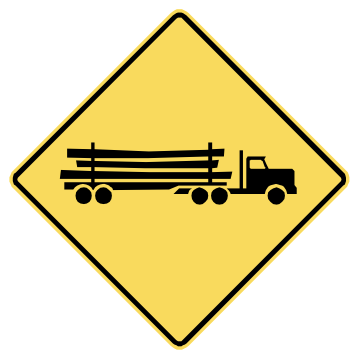 | 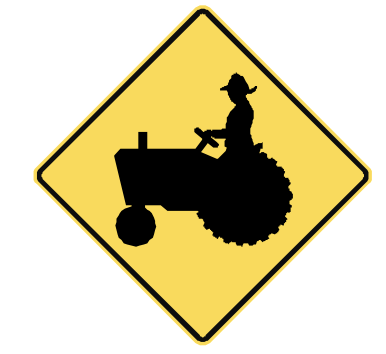 |
| FIRE TRUCK ENTRANCE | TRUCK CROSSING/TURNING | LOGGING TRUCKS | FARM VEHICLES |
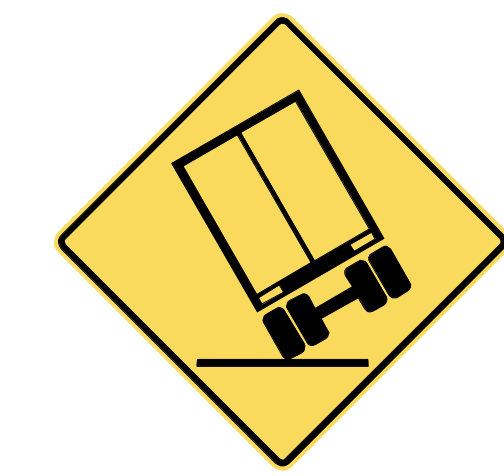 | 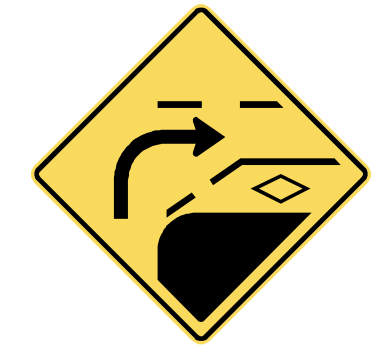 | 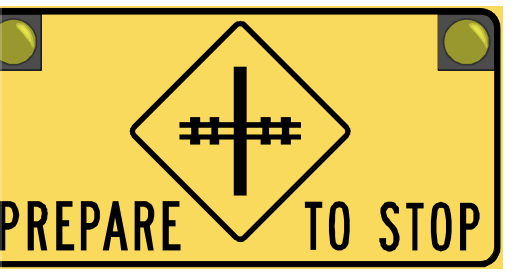 | 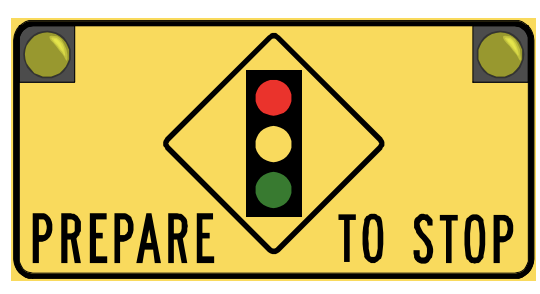 |
| TRUCK ROLLOVER WARNING | RESERVED LANE CROSSING (TURN INTO LANE BESIDE IT) | PREPARE TO STOP WHEN FLASHING (RAIL CROSSING) | PREPARE TO STOP WHEN FLASHING (TRAFFIC SIGNALS) |
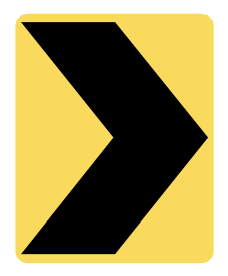 | 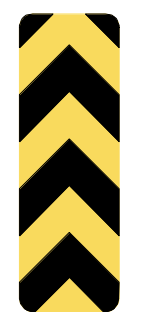 | 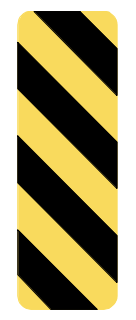 | 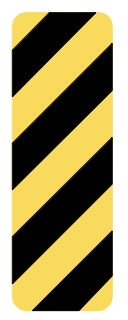 |
| CHEVRON – ADDITIONAL GUIDANCE IN HORIZONTAL ALIGNMENT | OBJECT MARKER – KEEP RIGHT OR LEFT OF OBSTRUCTION | OBJECT MARKER – KEEP LEFT OF OBSTRUCTION | OBJECT MARKER – KEEP RIGHT OF OBSTRUCTION |
Think of Canadian road signs as a colorful language that speaks to drivers. Here’s the breakdown:
- Yellow Signs – Caution Ahead
- White, Black, and Red Signs – The Law Speaks
- Green and Blue Signs – Road Info Center
- Orange Signs – Construction Alert
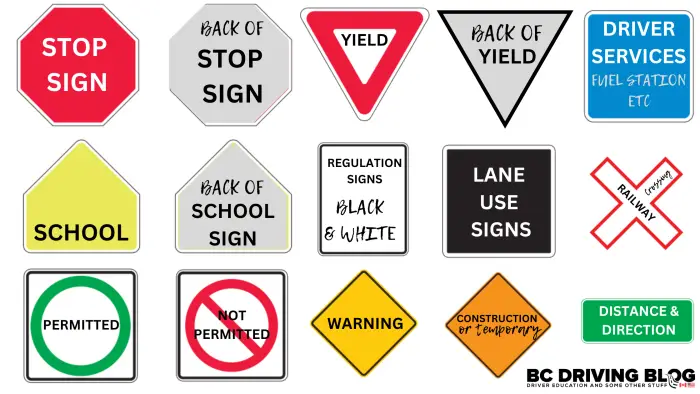
A Word About Road Sign Shapes
Imagine a world where road signs possess unique shapes, like secret codes waiting to be deciphered. These signs, unlike their counterparts, don’t share their distinctive forms with any other. Take the stop sign, for instance; it stands alone in its octagonal glory, a symbol of unwavering authority on the road, never to be confused with any other message. Then there’s the school zone sign, affectionately known as the “house-shaped” sentinel, guarding our children’s safety with its exclusive design.
Now, you might wonder why I’m sharing this intriguing tidbit with you.
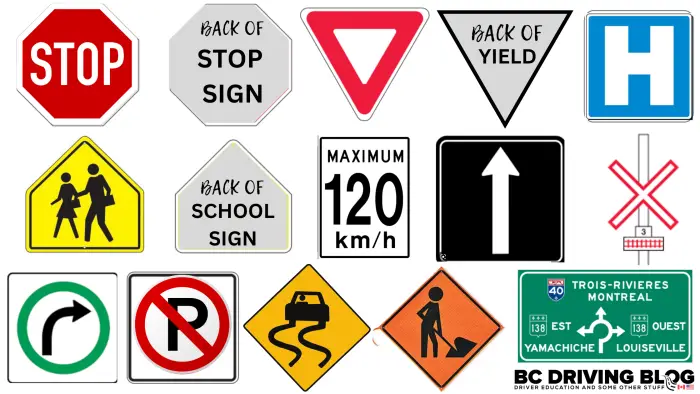
When Road Sign Shapes Speak to Oncoming Traffic
Astute drivers, like you and me, don’t just keep an eye out for road signs to navigate our own paths. We also keenly observe the shapes of those signs that stand sentinel over the lanes of oncoming, intersecting, or potentially conflicting traffic. This heightened awareness bestows upon us an instant, profound reservoir of knowledge.
Do Not Enter Road Sign
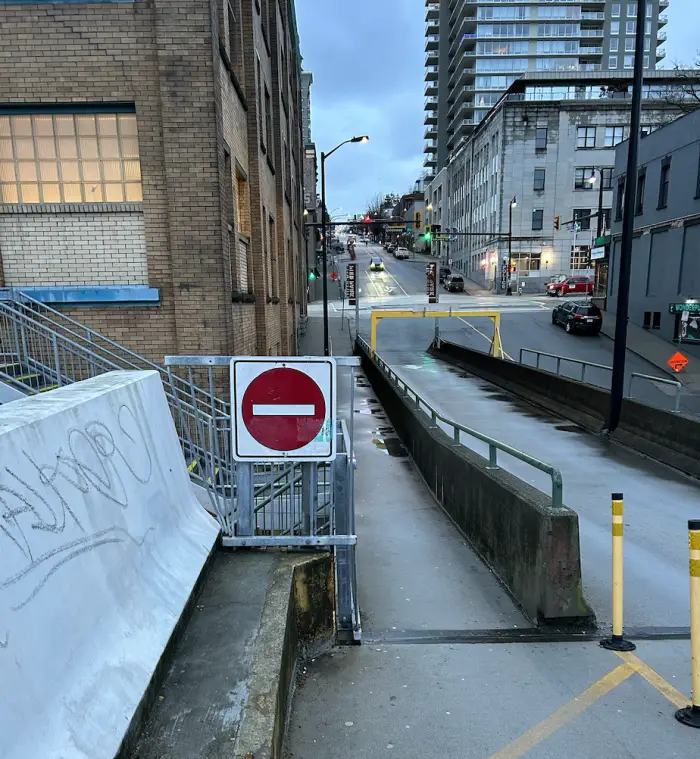
Introduction to Canadian Road Signs
Road signs of Canada can be understood in three ways:
- Their shape
- Their color
- The messages printed on them
Their colors mean different things:
- Warning signs – Yellow road signs are warnings of upcoming hazards. Hazards while driving are a real thing, and I’ve written about that too. If you see a speed limit on a sign with a yellow background, it’s a recommendation/advisory; not a law. However, road sign warnings are there for a reason and not merely to decorate the side of the road. Sticking to any speed advisory is always a good idea. Drivers may not get a speeding ticket if they don’t follow the speed advisory limit, but they might fall off the road. Drivers can always decide how fast to drive… but physics will have the final word on where the vehicle ends up, and that’s just facts.
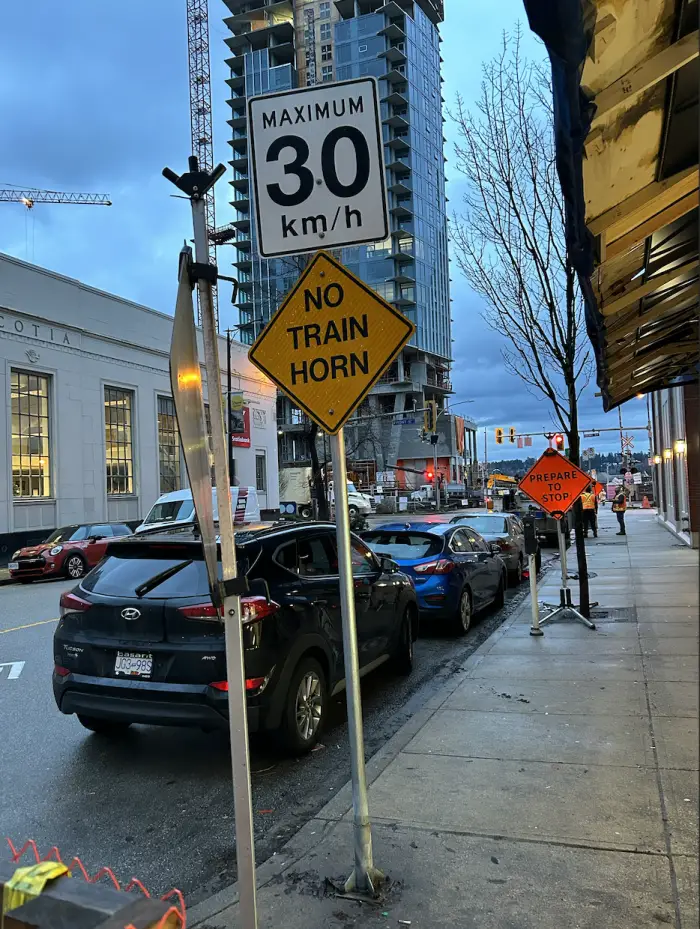
- Regulation signs – These are the law, and drivers who disobey them may receive penalties, such as Driver Penalty Points. These signs use a combination of colors that are white, black, red & green. Think speed limit signs, do not enter signs, crosswalk signs (stopping for pedestrians in marked and unmarked crosswalks is legally required unless you are unable to safely stop in time), and lane control signs, just as a few examples.
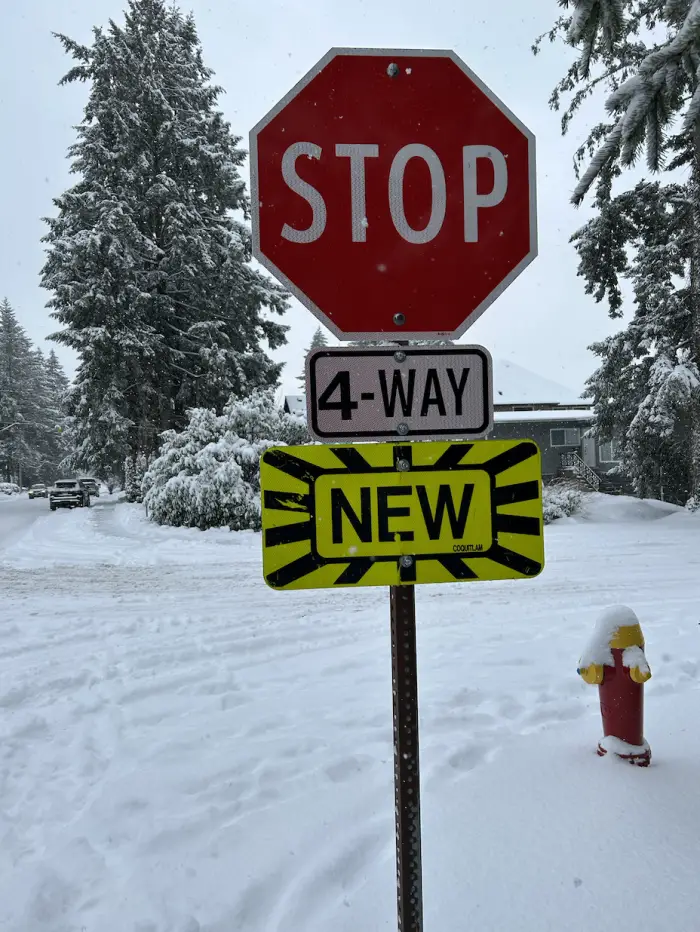
- Construction or temporary maintenance work signs – these are orange.
- Information & destination signs – These signs give information about destinations, route numbers, and facilities. These are most commonly green and blue. The most obvious place to see them is on highways and freeways, although they are virtually everywhere.
Obstruction Keep Left or Keep Right Sign
Imagine driving through the rain-slicked streets in the dead of night. The road ahead is shrouded in darkness, and suddenly, you spot them – these vigilant sentinels; object markers. They’re not just any markers; they’re your guiding lights, your silent guardians against the unknown.
In such treacherous conditions, where the world outside blurs into obscurity, these markers come to life. They don’t just warn you of an impending cement barrier; they whisper, “This way, traveler.” They tell you where to steer, whether it’s to the left or the right or perhaps either, ensuring your safe passage past the looming obstruction.
So, in the midst of rain and shadows – or everyday driving – remember to heed these markers’ call, for they are your trusty companions, lighting the way in the darkest of times.
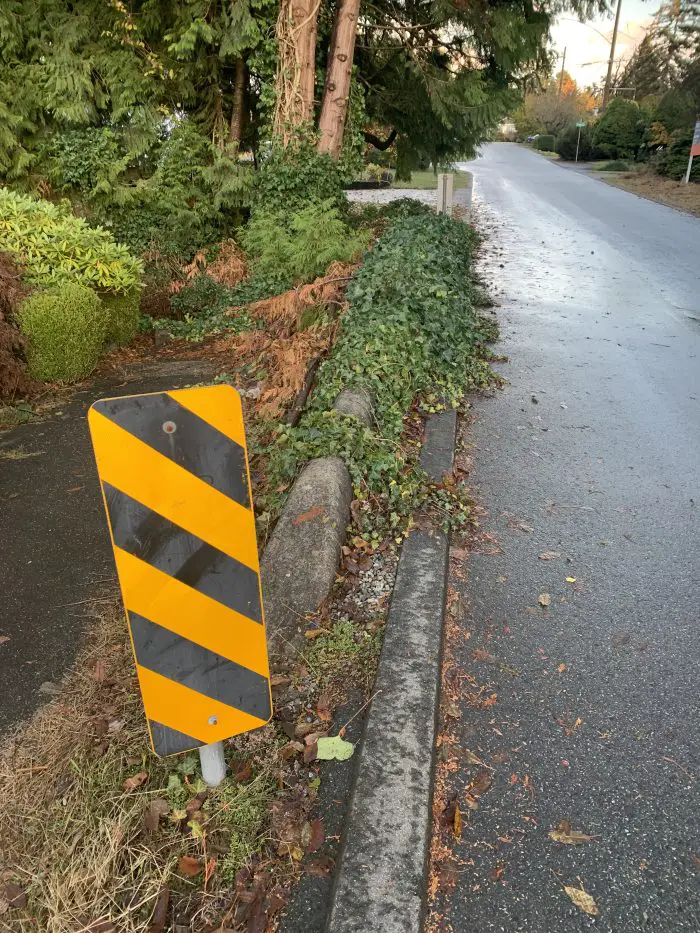
When a Multitude of Road Signs Appears
Picture yourself cruising down the bustling highway, surrounded by a multitude of road signs vying for your attention. It feels like a never-ending parade of information, and it’s practically a mission impossible to absorb it all in one glance. So, what’s the savvy move in this sign-filled symphony?
- On the hunt for a gas station? Look out for those trusty blue signs.
- Wondering how far you are from your destination? Green signs have got your back.
- When visibility’s poor or the weather’s acting up, prioritize yellow signs and regulation signs for safety. The blue and green ones can take a back seat for now. Stay on the right path!
The other thing about road signs that I’ve been noticing over the years is:
- They aren’t always clean
- They aren’t always visible to you
- And they are sometimes missing from where they were supposed to be
Yes, AWOL road signs are a real thing; you heard it here first.
Stop Sign Ahead Sign
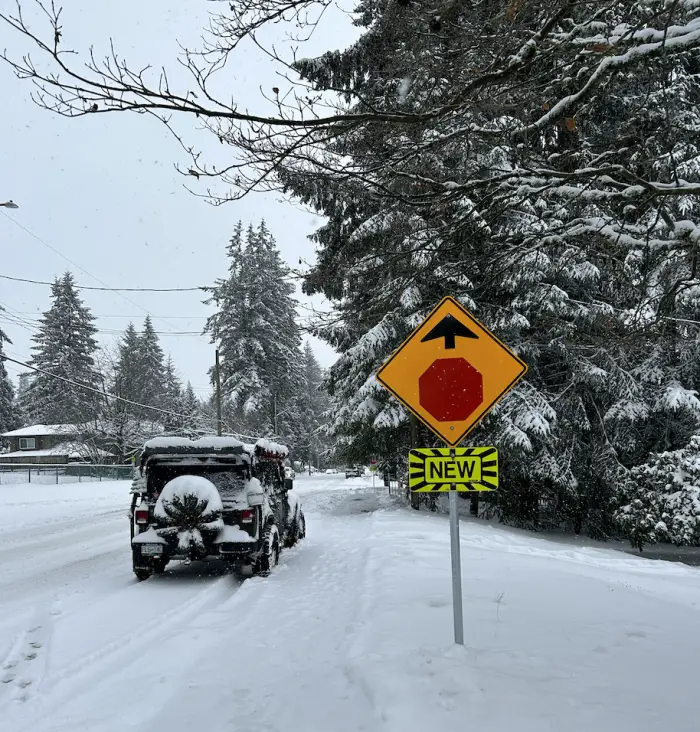
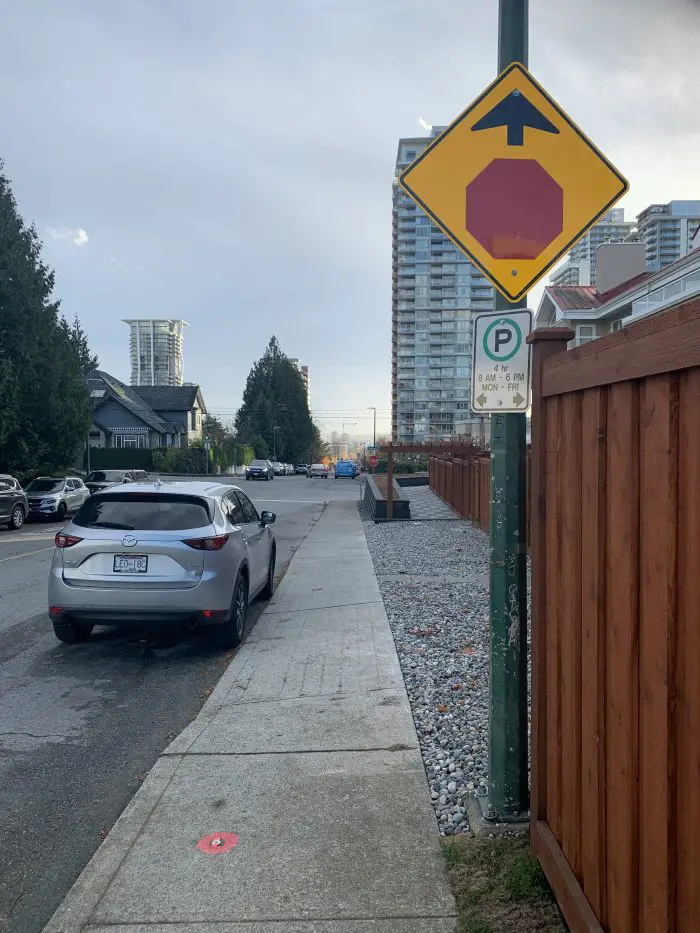
White & Black & Red Road Signs Of Canada
Road Signs of Canada – Stop Sign
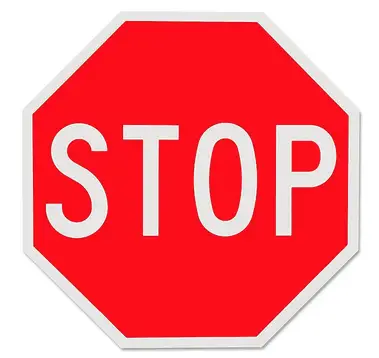
Typical Speed Limit Sign
Consider this common scenario with speed limit signs. Remember, you’re not obliged to match the speed displayed on the sign; it simply sets the maximum legal limit for your speed.
Speed Limit Road Signs of Canada
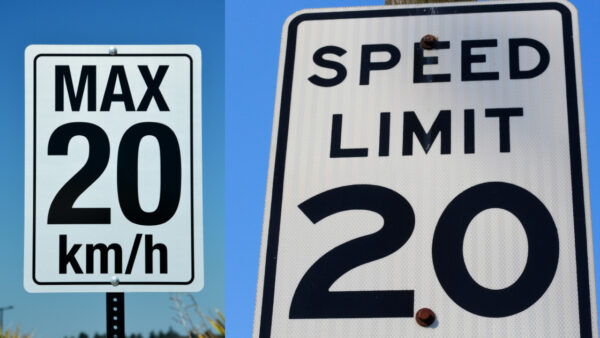
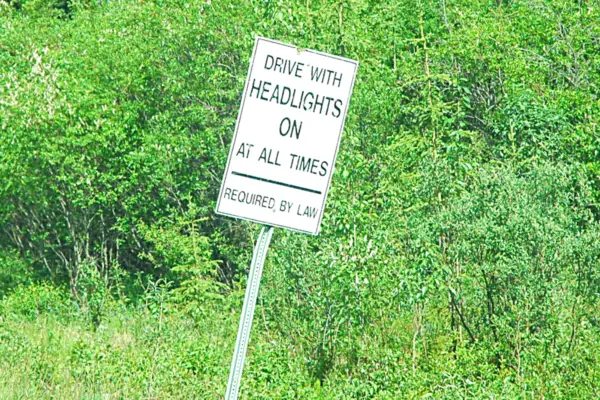
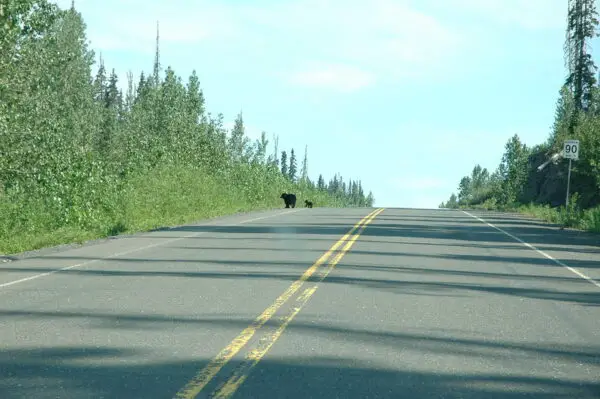
Canadian Speed Signs Are in Metric
Canadians’ road signs are in metric, so any Canadian speed sign is in kilometers (km).
- 1 mile = 1.6 km
- 1 km = 0.6 km
- Metric conversions calculator
Keep in mind it’s always up to the driver to decide on an appropriate speed, based on conditions. Examples of conditions are weather, road conditions, driver experience, condition of the vehicle, condition of the tires, condition of the driver, etc.
In Canada, speed limits are typically posted using the metric system, which means that distances are measured in kilometers, and speeds are expressed in kilometers per hour (km/h). Here’s a breakdown of how the metric system is applied to Canadian speed limits:
- Speed Limit Signs: Canadian speed limit signs prominently display the speed limit in kilometers per hour (km/h). For example, you might encounter speed limit signs that read “50 km/h” in urban areas, “100 km/h” on highways, or “80 km/h” on rural roads.
- Common Speed Limits:
- Urban Areas: Speed limits in urban or residential areas are often set at 50 km/h. However, local variations may exist, and some areas may have lower or higher limits depending on road conditions and local bylaws.
- Highways: On divided highways and major roads, you will frequently see speed limits of 100 km/h. However, this can vary, and some highways may have different speed limits based on factors like location, traffic flow, and road design.
- Rural Roads: In rural areas, speed limits often range between 80 km/h and 90 km/h. Again, local authorities may set different limits based on road conditions and safety considerations.
Enforcement: Speed limits in Canada are enforced using radar and laser speed detection devices, as well as police officers using visual observations and speed enforcement tools. Speeding fines can vary depending on the severity of the violation and the specific jurisdiction.
Conversion: For drivers accustomed to the imperial system (miles per hour), it’s important to convert speeds from km/h to mph when driving in Canada or when interacting with Canadian road signs. To convert from km/h to mph, you can use the approximate conversion factor of 1 km/h which is approximately equal to 0.6214 mph.
Keep in mind that while these are common speed limits in Canada, specific speed limits can vary by province or territory, and local regulations may apply. Drivers need to be aware of and adhere to the posted speed limits in the region they are traveling through to ensure safety and avoid potential traffic violations.
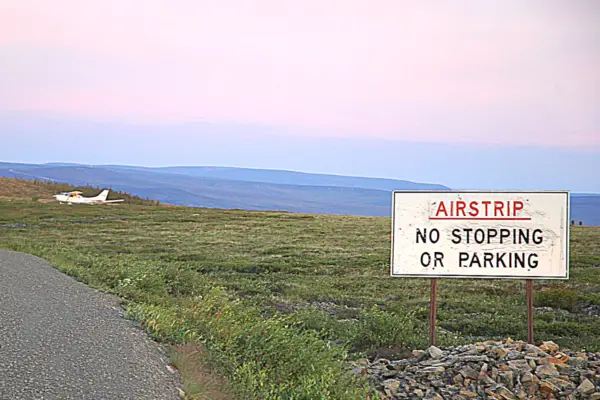
How Can You Tell If There Will Be a Turning Lane?
Lane use signs
Check for black and white signs hanging above and before intersections. These can help a lot with knowing which lane goes where. Check out my guide to Intersections in British Columbia to learn more about the different types of intersections there are.
Lane Use Signs – Black & White
Lane use signs are like traffic rules that tell you which lanes to use when you want to turn or go straight at an intersection. These signs are usually placed above the lanes or on the side of the road before you reach the intersection.
Once you’re in one of these lanes, you must follow the direction shown by the arrows on the sign. It’s the law. Don’t switch lanes while you’re inside the intersection. So, remember to stay in the lane that matches the direction you want to go. It makes driving safer for everyone.
Related: why it’s a bad idea to change lanes in an intersection.
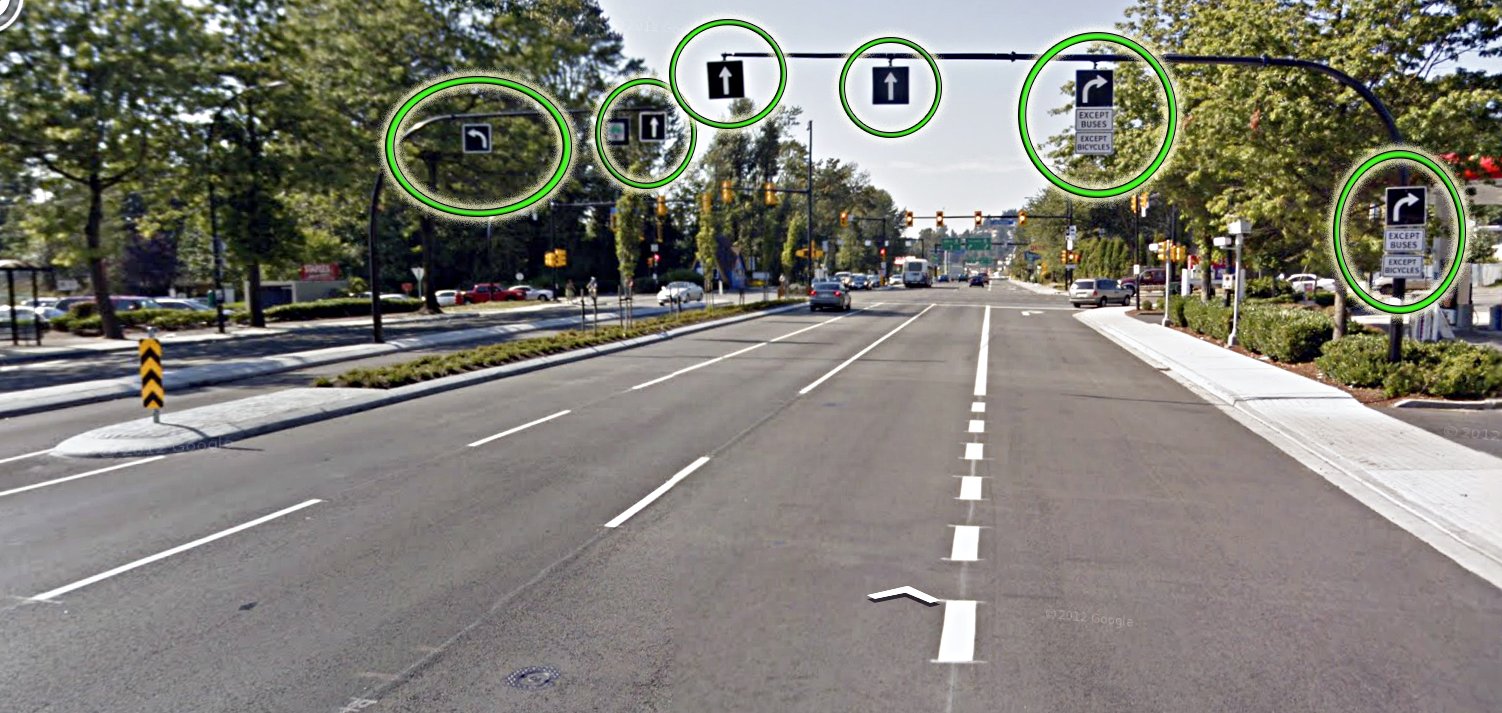
Yield Sign – Regulation Sign
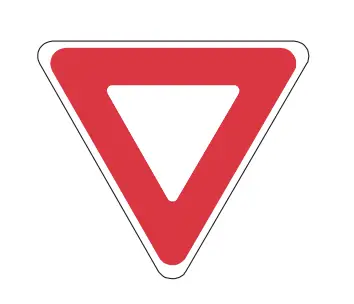
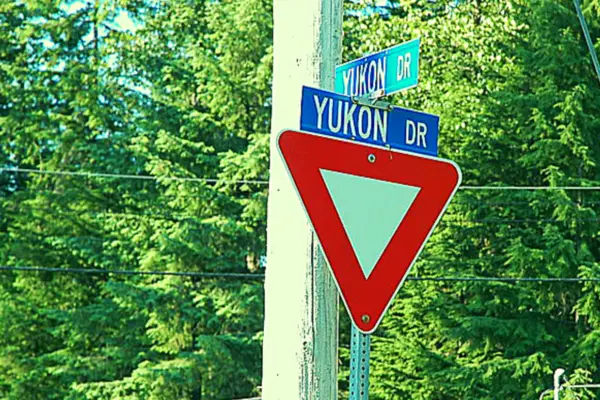
The yield sign isn’t just a road rule; it’s a symbol of courtesy and safety. When you encounter this sign, you must grant the right of way to fellow road users. Show respect and let them take precedence, especially when conflicts could arise. Sometimes – but not necessarily, depending on visibility and other conditions – it may even require you to come to a complete stop. Read more about it with these related articles.
Yield Signs – BC Motor Vehicle Act
Yield signs
173 (1)Except as provided in section 175, if 2 vehicles approach or enter an intersection from different highways at approximately the same time and there are no yield signs, the driver of a vehicle must yield the right of way to the vehicle that is on the right of the vehicle that he or she is driving.
(2)Except as provided in section 175, if 2 vehicles approach or enter an intersection from different highways at approximately the same time and there is a yield sign, the driver of a vehicle facing the sign must yield the right of way to all other traffic.
Beautiful British Columbia Motor Vehicle Act
Speed Limit Change Soon Sign
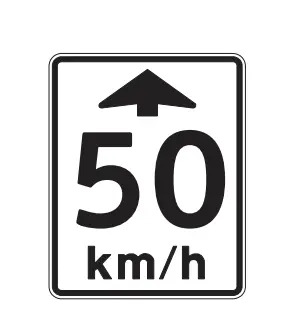
Imagine this cool black-and-white speed sign. It’s got a bold black arrow on top, and that arrow holds a secret. It’s telling you that the speed limit is about to change and slow down soon up the road.
So, from the moment you spot this sign, start slowing down. When you reach the next one (which will look the same but without the arrow), you need to make sure your vehicle’s speed matches what’s written on the sign, which is the fastest speed you’re allowed to go. It’s like a little countdown to keep you driving safely.
Disaster Response Route Road Sign
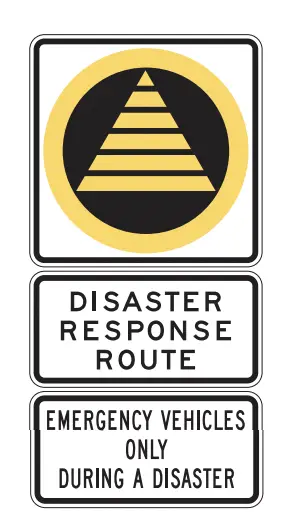
Spot this crucial disaster response route sign: “Reserved for Emergency Vehicles Only in Times of Crisis.” These signs are strategically placed along vital roadways and routes. They serve as a vital reminder, imploring drivers to keep these lifelines clear during major disasters or emergencies. By doing so, we ensure swift and unobstructed access for the heroes on wheels, racing to save lives when every second counts. Related Article: BC Emergency Vehicle Etiquette and Best Practices.
Do Not Enter Road Signs of Canada
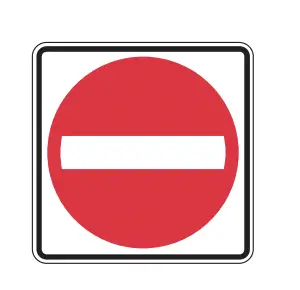
Behold, the mystical and enigmatic regulation sign that practically shouts, “Thou shalt not pass!” This ubiquitous road sentinel is as common as a squirrel raiding a bird feeder and is often spotted gracing the entrances of freeway exit ramps, one-way streets, and other thoroughfares.
Picture this: you’re cruising down the asphalt river of life, your trusty steed (read: car) humming along like a caffeinated hummingbird. Suddenly, you spy this sign, and it’s like the road’s equivalent of a bouncer at an exclusive club, except it’s not interested in your VIP status or your persuasive dance moves.
This “do not enter” sign means business. It’s like a medieval drawbridge that refuses to lower for just anyone. It’s the Gandalf of the road, sternly declaring, “You shall not pass!” And if you try to defy its authoritarian charm, well, let’s just say you might become a contestant in the bumper-car version of a reality TV show.
So, next time you encounter this traffic sage, remember, it’s not a suggestion, it’s not a friendly wave—it’s an unyielding decree from the road gods themselves. Do not enter, unless you fancy yourself a contestant in the world’s most chaotic game of “Red Light, Green Light.”
Yellow Road Signs Of Canada
Ever wondered why warning signs are so yellow? Well, it’s not because they’re trying to win a spot in the sunshine. These yellow-backed signs are like Mother Nature’s way of saying, “Hey there, danger ahead!” They’re like the party poopers of the road, warning us about all the hazards that want to ruin our driving parade.
And speaking of shapes, warning signs are the divas of the signage world – they love to flaunt their diamond shape. It’s like they’re saying, “We might be warning you, but we’re also rockstars of the road.” Watch out for those diamond-clad divas; they’ve got important news to deliver.
Speed Signs on a Yellow Sign
Now, let’s talk about speed signs on yellow backgrounds. They’re like your GPS’s polite cousin – they suggest a speed limit, but it’s not the law. It’s more like a gentle nudge in the right direction as if they’re saying, “Hey, buddy, you might wanna slow down a bit.” You can choose to listen or live life in the fast lane – your call; your consequences.
But remember, there’s a big difference between recommendations and decorations. You don’t want to confuse a speed sign with a party banner. Following a speed recommendation will keep you safe while decorating your car with streamers probably won’t. So, heed the signs, but leave the confetti at home.
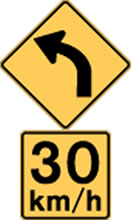
Adhering to the yellow speed limit sign is certainly wise, but what if I told you that going just 5 km/h over it isn’t akin to breaking the law, unlike those ominous white-background signs? Sounds intriguing, doesn’t it?
Now, picture this: as you journey forward, the road gracefully winds to the right, but it’s not always as clear-cut as it may seem. In broad daylight, spotting the impending curve might be a walk in the park, but imagine the challenge when darkness blankets the road, or worse yet when rain adds its enigmatic touch to the mix.
These are called chevrons. Not too different from the Chevron station sign, eh?
Chevron Road Signs
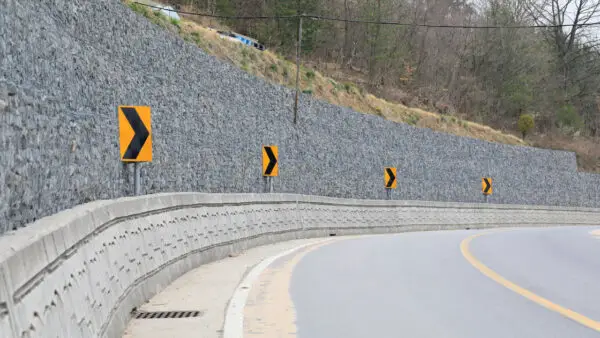
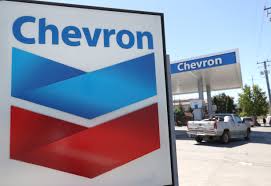
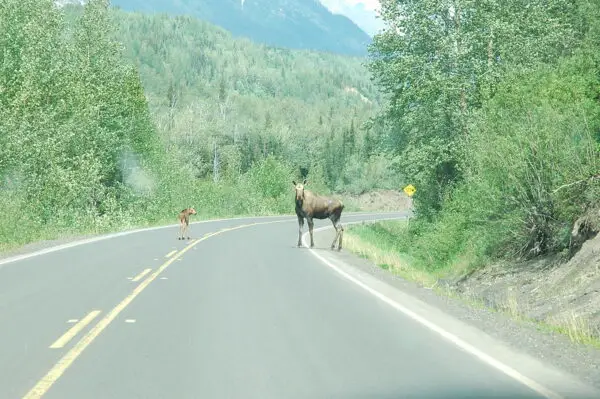
Imagine you’re cruising down the open road, and you come across a curve. You glance around, searching for any speed advisory signs, but there’s none in sight. In this thrilling moment, it’s like Mother Nature and the highway designers have given you a nod of approval.
In simple terms, when there’s no warning sign before a curve, the road whispers to you, “You can maintain that speed limit without breaking a sweat” (while still keeping an eye on the road conditions, of course).
So, in the absence of those cautionary hints, you can keep your pedal steady. You only need to hit the brakes when those ominous signs show up, signaling that the road has a surprise in store for you. However, always trust your instincts and exercise extra caution when you venture into unfamiliar territory. It’s your road adventure, after all.
Yellow Signs & Yellow Speed Signs
Vibrant yellow speed signs have often left student drivers bewildered, creating a tapestry of uncertainty on the road. When you venture into the world of driving, it doesn’t take long to realize that any sign adorned with the bold backdrop of yellow carries a profound message of caution. Consider this, for instance:
The Following sign warns of a crosswalk ahead, that’s it
The speed limit doesn’t change because of this sign. It is just telling you to watch for a pedestrian crosswalk coming up soon. You can slow down if you see a good reason of course.
Crosswalk Ahead Warning Sign
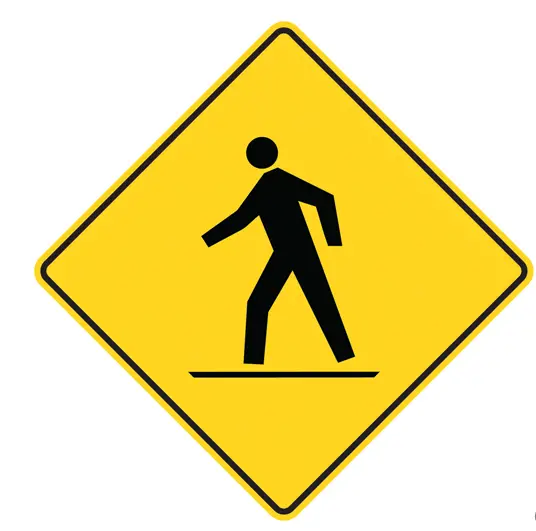
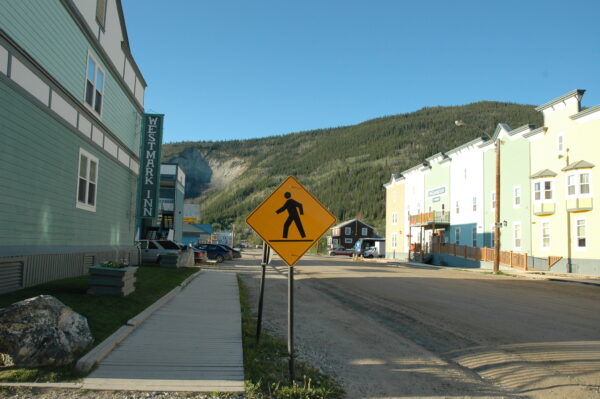
Yellow Signs Are Warning Signs
They warn of hazards ahead
It’s time to brush up on your road signs. Let’s start with something simple, a nice curve road sign. Since this is a yellow sign, it’s a warning sign. Most warning signs are yellow, and diamond‑shaped. They warn of possible hazards ahead.
Let’s see this curve ahead road sign in context
While it might be obvious during the daytime that there is a curve coming, it’s not always the case at night. Especially when it’s raining or bad visibility, one will really learn to appreciate these road signs.
Sharp Curve Ahead Warning Sign
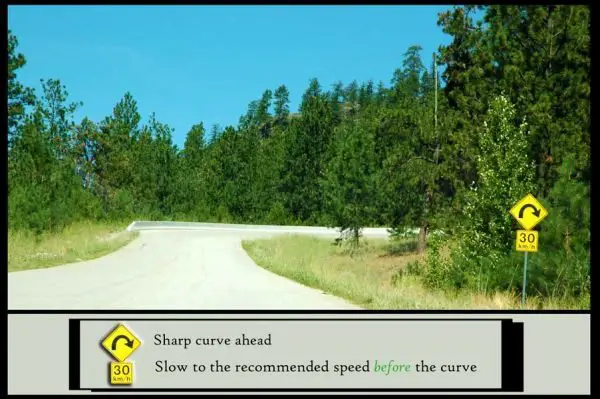
Since the 30 km/hr speed tab is on a yellow background, this is a recommendation, not a law. However, it is obviously there for a good reason, and not for decorative purposes. If you proceed around the curve too fast, your car will tend to continue in a straight line as per physics, so do proceed with caution.
The Chevron Road Sign
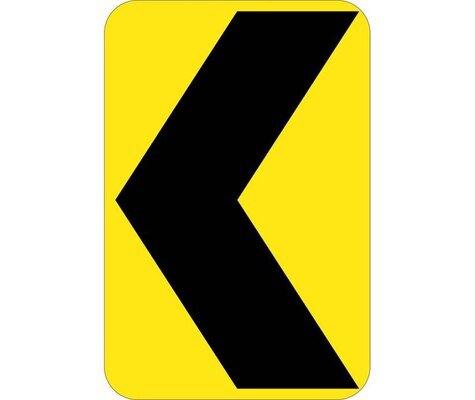
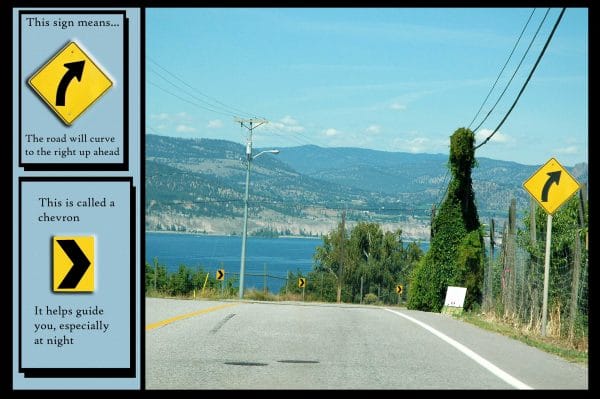
Playground Zone Sign With Speed Tab

This is a playground zone.
Since the speed tab is white and black and not yellow, it means you legally must slow to 30 km/hr when the playground zones are in effect.
This is every single day of the year from dawn until dusk unless otherwise posted. Check out my full article on school and playground zones to learn more about them.
Road Signs of Canada: Playground Nearby Sign Without Speed Tab
The following is a sign warning that there’s a playground nearby. The speed limit does not change, because there’s no speed tab. Drivers do not need to be psychic when driving (although that never did hurt anyone). Drivers must simply obey road signs. Check out my full article on School and Playground Zones to learn more about those.
In other words, if a playground sign does not warn of a speed change, then the legal speed limit is still whatever it was before you saw the sign. It’s simply warning you because there may be children nearby. Don’t overthink it!
Playground Warning Sign
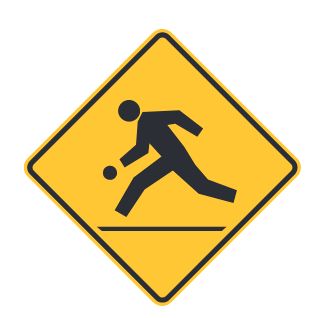
The End of the Road (Checkers) Sign
This is the ‘end of the road’ sign. In other words, there is no more road here. You usually will need to turn around when you see these.
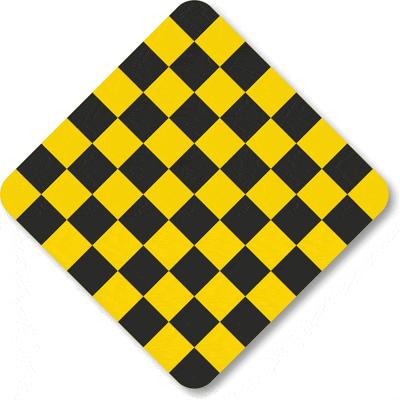
Notice how it’s eerily similar in design to the checkered flag indicating the end of a Formula 1 car race. Just something I noticed one day while daydreaming.
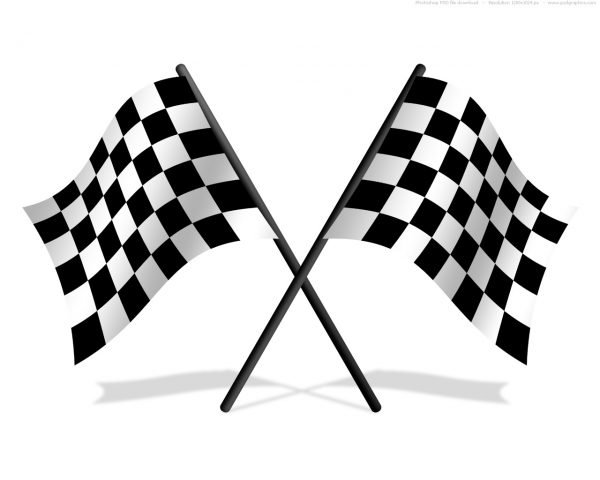
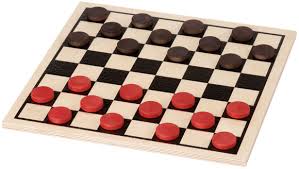
Driving On the Shoulder – Yellow Road Signs Of Canada
This ‘soft shoulder’ yellow sign is a warning sign. You don’t necessarily have to slow down, because the sign does not indicate the need.
The following ‘do not drive on the shoulder’ sign is a regulation sign. Its white and black colors make it so. If you drive on the shoulder, you’re breaking the law.
Soft Shoulder Road Sign Canada
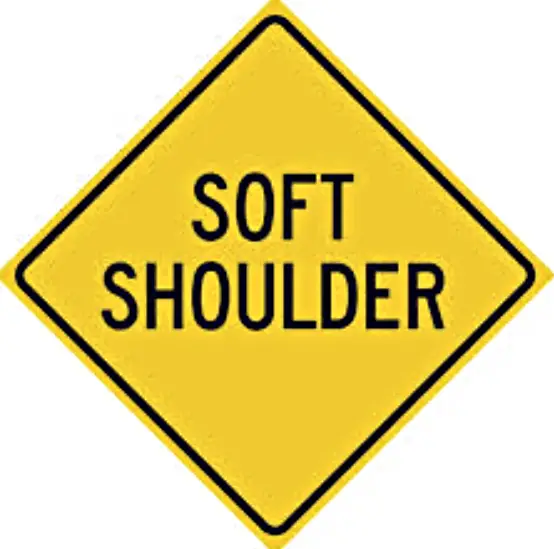
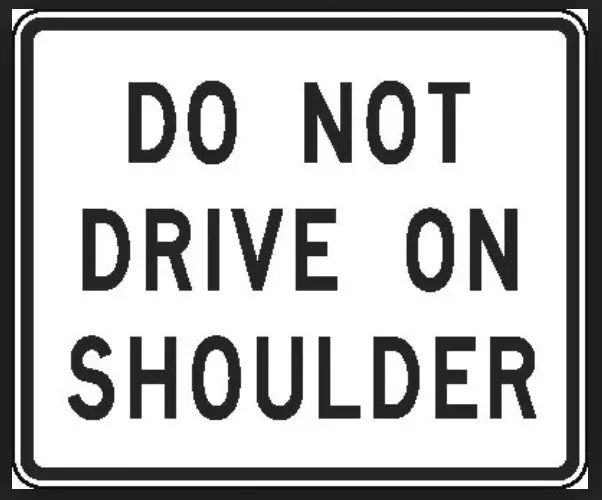
Road Signs Of Canada: What is a shoulder?
The shoulder is essential to the edge of the road. It’s not a “real” lane.
We aren’t supposed to drive in it, ever. Sometimes people pull over to the shoulder in emergencies or for a flat tire situation, but this is not considered safe. The shoulder is often quite narrow. Sometimes motorcycles try to speed down the shoulder, but some of them end up crashing into broken-down vehicles that have been parked there without choice.
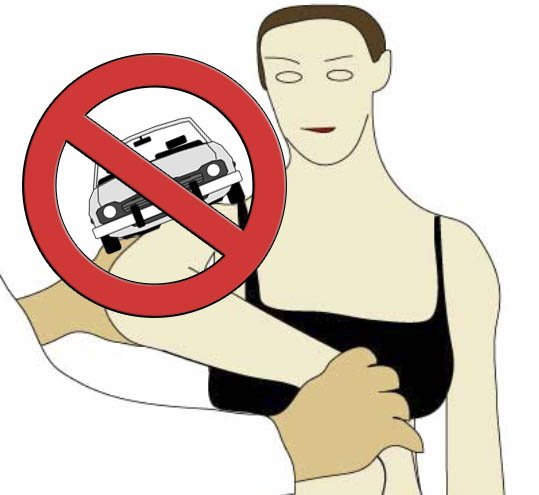
Question – Turning right when there is a shoulder
A question from Shannon.
Q: I know to stay toward the center line when turning left, and the curb when turning right, or to merge into the bike lane if there is one. But what about turning right when there is a shoulder but no curb?
It seems reasonable to me to move over a bit into the shoulder, but the manual is very clear that “you may not drive on or across the shoulder or edge line of the road unless a sign permits it”, so I’m not sure what to do.
Good question! Generally, driving on the shoulder is a big no-no. It is not an actual lane intended for use by vehicles and is illegal in many places.
This is generally not a safe place to drive because no one expects you to be there, there may be stuff like nails and other sharp or random objects there, or there may be broken-down vehicles.
Or, the shoulder may be reserved as a bike lane, like it is on Highway 1 in West Vancouver. Never drive on the shoulder unless you are moving there in an emergency or your vehicle is breaking down.
In terms of turning right, drivers are expected to move toward the right – but not onto the shoulder – before turning.
Some drivers will go on the shoulder anyway, even when they aren’t supposed to, so be aware of your surroundings – practice defensive driving skills – and check your mirrors & shoulder check your blind spot before turning just in case.
Sometimes motorcycles drive on the shoulder to bypass traffic, but this is positively illegal.

What’s a Soft Shoulder?
Soft shoulder means that the pavement transitions into gravel/dirt at the shoulder or edge of the lane that you are driving in.
Usually, shoulders are ‘hard’ i.e. made of normal pavement. So usually, if you drive a bit over the edge, nothing crazy will happen. However…
If your car goes off of the pavement and hits the soft shoulder, there is a possibility you could lose control of your car quite easily.
If you do find that you have somehow meandered onto the soft shoulder, the safest thing to do is to make sure you return to the pavement very gradually. Make no sudden movements; sudden movements here will bring on a sudden ‘adventure’ (not in a good way).
Road Signs Of Canada – Grade % Slope Sign
Ever wondered what this road sign means?

Basically, it means that for every 100 units you go straight, you decline by 8 units. In other words, there’s a huge hill coming up soon, so be prepared.
Road Signs Of Canada – Freeway & Highway Signs
Green Highway Signs in Canada
Green signs are typically for destinations and route numbers.
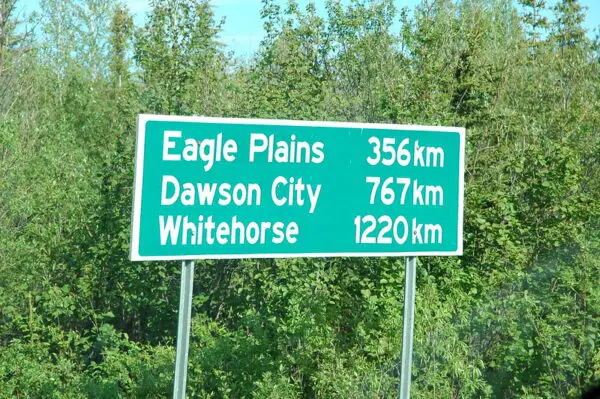
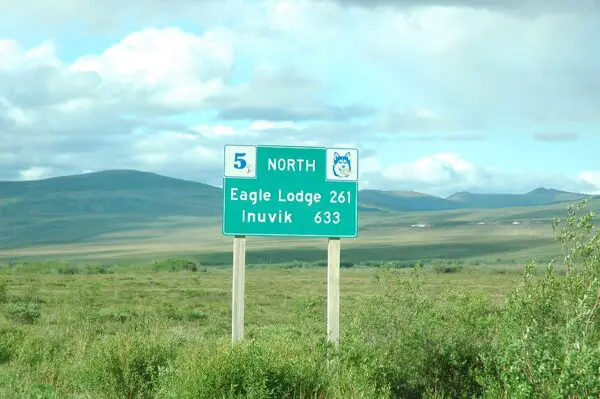
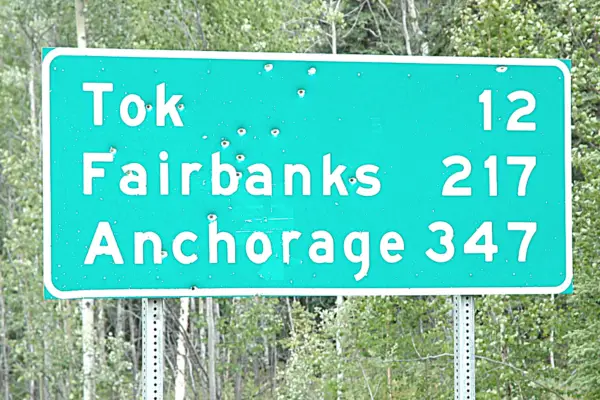
Road Signs Of Canada – Blue Highway Signs
Blue signs are often for services and attractions such as food, hotel, gas, camping, boat launch, rest area, etc.
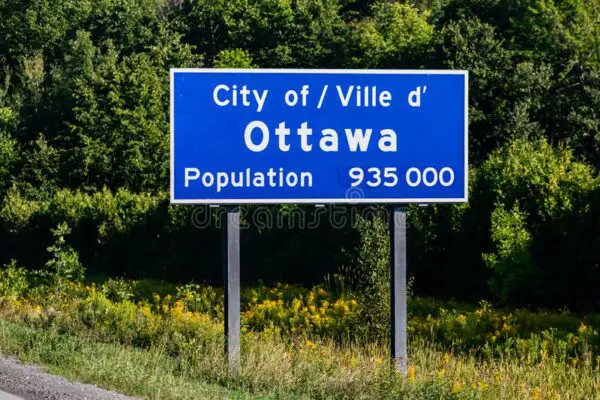
Obstruction Road Signs Otherwise Known as Object Markers- Yellow and Black
These wonderful little signs help warn us – especially helpful at night time – that there is an object or obstruction on the road. It lets us know which side of the object we should stay to – left or right; or either way (just don’t go straight thru obviously.)
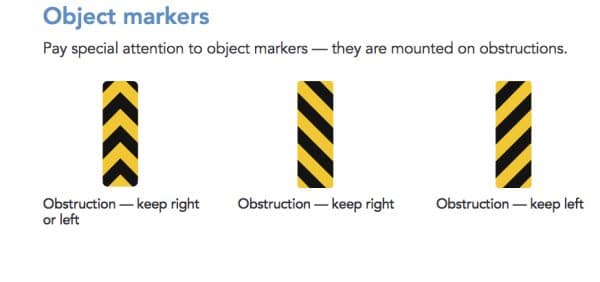
Now let’s see all these signs in a real example:
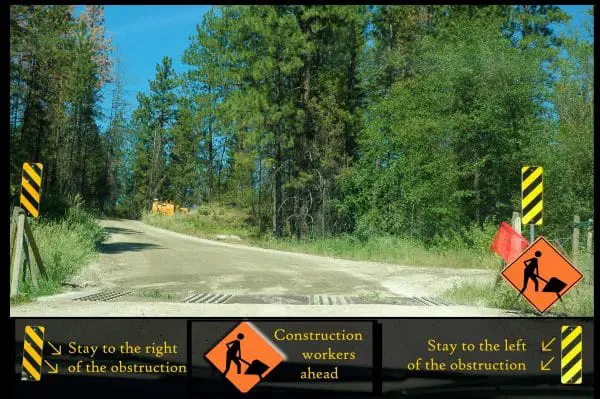
Reminder About Turning Restriction Signs & Sign Location
Road Signs Of Canada – Details… Details
Any sign white, black, red, green, or any combination of those colors is a regulation sign and refers to an action you can or can not do Right Here, Right Now.
Notice a typical crosswalk sign. It means you are legally required to stop for pedestrians in the crosswalk and the crosswalk is right here, at the same location as the sign. Check out my full article on Marked and Unmarked Crosswalks in BC.

This is as opposed to the yellow sign with the same symbol, which means, “There is a pedestrian crosswalk up ahead. Be prepared to scan and stop if there are pedestrians.”
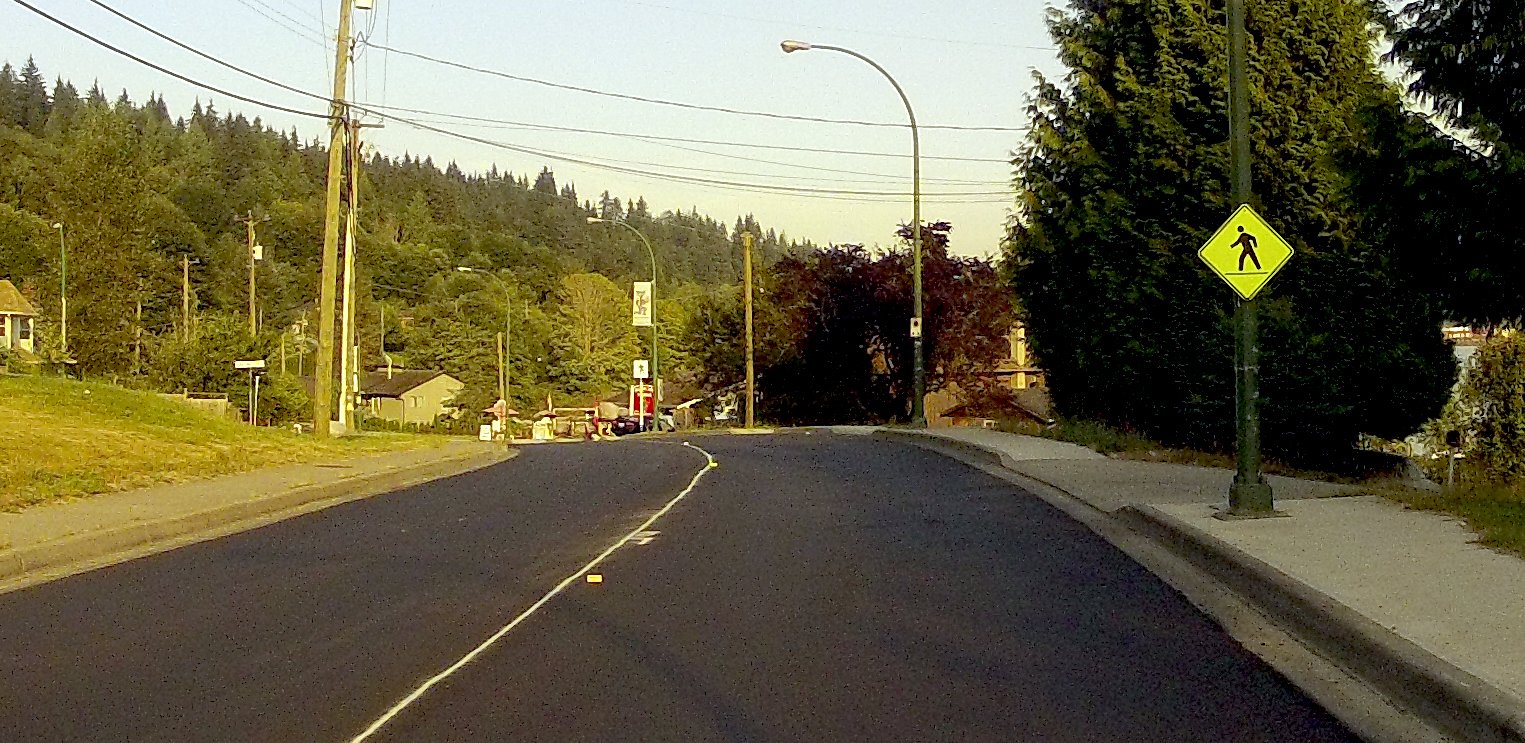
Holmes & E. Columbia – New Westminster
Enter Holmes & E. Columbia/North Road in New Westminster. This turning restriction is for the lane since it is posted at the lane, not the intersection. Drivers may still turn right at the intersection. It’s a white and black sign so it means “Do not turn right, right here,” not, “Do not turn right up there in 1/2 block.”
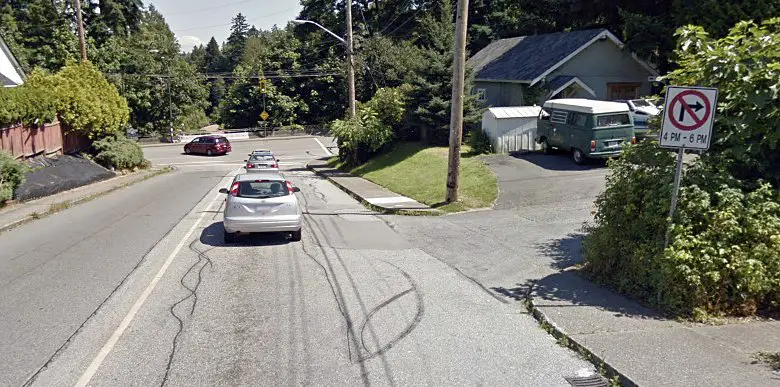
Road Signs Of Canada – Conclusion
Road signs of Canada are color coded so you can tell what kind of sign you’re dealing with by the color. Some colors are for regulation signs, which means you’d be breaking the law if you don’t follow the instructions on the signs.
Other signs are yellow and are meant as a warning, recommendation, or suggestion.
Blue and green signs are most commonly found on highways and freeways and mostly have to do with directions, exits, attractions, etc.
Lastly, orange signs are construction or temporary signs. Follow the instructions carefully because construction zones bring added hazards of course.
Besides the colors, you can tell a lot about road signs by their shapes. For example, the stop sign is the only sign with that shape. That shape sign will never say, for example, ‘GO,’ or anything else. It will always say ‘Stop.’ It will always be red and white.
This is good to know because as motorists we need to identify the ‘backs’ of signs in order to determine what the drivers facing us are seeing. This will give us a certain amount of confidence or educated guess as to what that driver is supposed to be doing or how they are supposed to be acting at a certain intersection or area.
Now that you’ve mastered road signs, why not brush up on your road lines? Those are just as important as the road signs of Canada. Thank you for reading and drive safely!
Read more from ICBC: Learn To Drive Smart: Signs, Signals & Road Markings
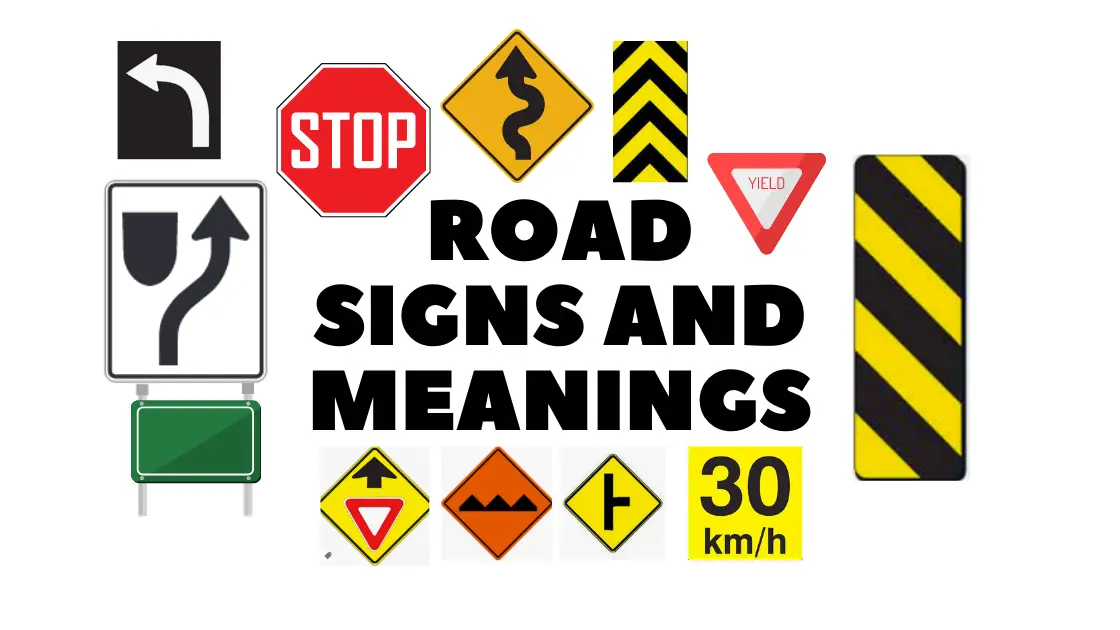
A woman was driving across the white lines in a parking lot not bothering to use the lane that was…